#data factory data flows
Explore tagged Tumblr posts
Text
[Fabric] Integración de datos al OneLake
Ya viste todos los videos con lo que Fabric puede hacer y queres comenzar por algo. Ya leiste nuestro post sobre Onelake y como funciona. Lo siguiente es la ingesta de datos.
En este artículos vamos a ver muchas formas y opciones que pueden ser usadas para añadir datos a onelake. No vamos a ver la profundidad de como usar cada método, sino una introducción a ellos que nos permita elegir. Para que cada quien haga una instrospección de la forma deseada.
Si aún tenes dudas sobre como funciona el Onelake o que es todo eso que apareció cuando intentaste crear uno, pasa por este post para informarte.
Ingesta de datos
Agregar datos al Onelake no es una tarea difícil pero si analítica puesto que no se debe tomar a la ligera por la gran cantidad de formas disponibles. Algunas serán a puro click click click, otras con más o menos flexibilidad en transformaciones de datos, otras con muchos conectores o tal vez con versatilidad de destino. Cada forma tiene su ventaja y posibilidad, incluso puede que haya varias con la que ya tengan familiaridad.
Antes de iniciar los métodos repasemos que para usar nuestro Onelake primero hay que crear una Lakehouse dentro de un Workspace. Ese Lakehouse (almacenado en onelake) tiene dos carpetas fundamentales, Files y Tables. En Files encontrabamos el tradicional filesystem donde podemos construir una estructura de carpetas y archivos de datos organizados por medallones. En Tables esta nuestro spark catalog, el metastore que puede ser leído por endpoint.

Nuestra ingesta de datos tendrá como destino una de estos dos espacios. Files o Tables.
Métodos
Data Factory Pipelines (dentro de Fabric o Azure): la herramienta clásica de Azure podría ser usada como siempre lo fue para este escenario. Sin embargo, hay que admitir que usarla dentro de Fabric tiene sus ventajas. El servicio tiene para crear "Pipelines". Como ventaja no sería necesario hacer configurationes como linked services, con delimitar la forma de conexión al origen y seleccionar destino bastaría. Por defecto sugiere como destino a Lakehouse y Warehouse dentro de Fabric. Podemos comodamente usar su actividad estrella "Copy Data". Al momento de determinar el destino podremos tambien elegir si serán archivos en Files y de que extensión (csv, parquet, etc). Así mismo si determinamos almacenarlo en Tables, automáticamente guardará una delta table.

Data Factory Dataflows Gen2: una nueva incorporación al servicio de Data Factory dentro de Fabric son los Dataflows de Power Query online. A diferencia de su primera versión esta nueva generación tiene fuertes prestaciones de staging para mejor procesamiento, transformación y merge de datos junto a la determinación del destino. Así mismo, la selección del destino nos permite determinar si lo que vamos a ingestar debería reemplazar la tabla destino existente o hacer un append que agregue filas debajo. Como ventaja esta forma tiene la mayor cantidad de conectores de origen y capacidades de transformación de datos. Su gran desventaja por el momento es que solo puede ingestar dentro de "Tables" de Lakehouse bajo formato delta table. Mientras este preview también crea unos elementos de staging en el workspace que no deberíamos tocar. En un futuro serán caja negra y no los veremos.

Notebooks: el hecho de tener un path a nuestro onelake, path al filesystem con permisos de escritura, hace que nuestro almacenamiento pueda ser accedido por código. El caso más frecuente para trabajarlo sería con databricks que, indudablemente, se convirtió en la capa de procesamiento más popular de todas. Hay artículos oficiales de la integración. En caso de querer usar los notebooks de fabric también son muy buenos y cómodos. Éstos tienen ventajas como clickear en files o tablas que nos genere código de lectura automáticamente. También tiene integrada la herramienta Data Wrangler de transformación de datos. Además cuenta con una muy interesante integración con Visual Studio code que pienso podría integrarse a GitHub copilot.
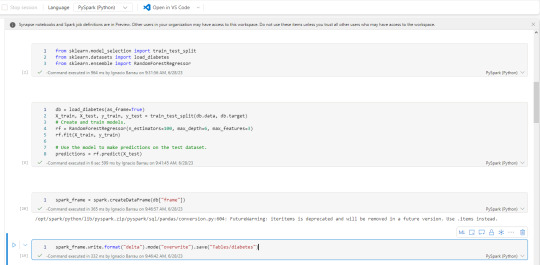
Shortcuts (accesos directos): esta nueva opción permite a los usuarios hacer referencia a datos sin copiarlos. Genera un puntero a archivos de datos de otro lakehouse del onelake, ADLS Gen2 o AWS S3 para tenerlo disponible como lectura en nuestro Lakehouse. Nos ayuda a reducir los data silos evitando replicación de datos, sino punteros de lectura para generar nuevas tablas transformadas o simplemente lectura para construcción de un modelo o lo que fuere. Basta con clickear en donde lo queremos (tables o files) y agregarlo.
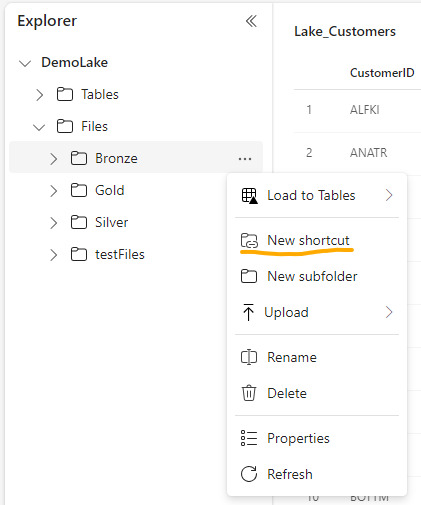
Upload manual: con la vista en el explorador de archivos (Files) como si fuera un Azure Storage explorer. Tenemos la clásica posibilidad de simplemente agregar archivos locales manualmente. Esta posibilidad solo estaría disponible para el apartado de Files.
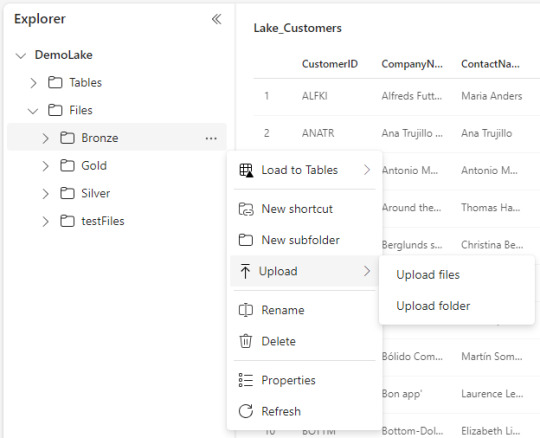
Explorador de archivos Onelake (file explorer): una de las opciones más atractivas en mi opinión es este cliente para windows. Es incontable la cantidad de soluciones de datos que conllevan ingresos manuales de hojas de cálculo de distintas marcas en distintas nubes. Todas son complicadas de obtener y depositar en lake. Esta opción solucionaría ese problema y daría una velocidad impensada. El cliente de windows nos permite sincronizar un workspace/lakehouse que hayan compartido con nosotros como si fuera un Onedrive o Sharepoint. Nunca hubo una ingesta más simple para usuarios de negocio como ésta que a su vez nos permita ya tener disponible y cómodamente habilitado el RAW del archivo para trabajarlo en Fabric. Usuarios de negocio o ajenos a la tecnología podrían trabajar con su excel cómodos locales y los expertos en data tenerlo a mano. Link al cliente.

Conclusión
Como pudieron apreciar tenemos muchas formas de dar inicio a la carga del onelake. Seguramente van a aparecer más formas de cargarlo. Hoy yo elegí destacar éstas que son las que vinieron sugeridas e integradas a la solución de Fabic porque también serán las formas que tendrán integrados Copilot cuando llegue el momento. Seguramente los pipelines y notebooks de Fabric serán sumamente poderosos el día que integren copilot para repensar si estamos haciendo esas operaciones en otra parte. Espero que les haya servido y pronto comiencen a probar esta tecnología.
#fabric#fabric tutorial#fabric tips#fabric training#data fabric#data engineer#data engineering#microsoft fabric#fabric argentina#fabric jujuy#fabric cordoba#ladataweb#power query#power query online#powerbi#power bi#power bi dataflows#data factory#data factory data flows#power bi service
0 notes
Text
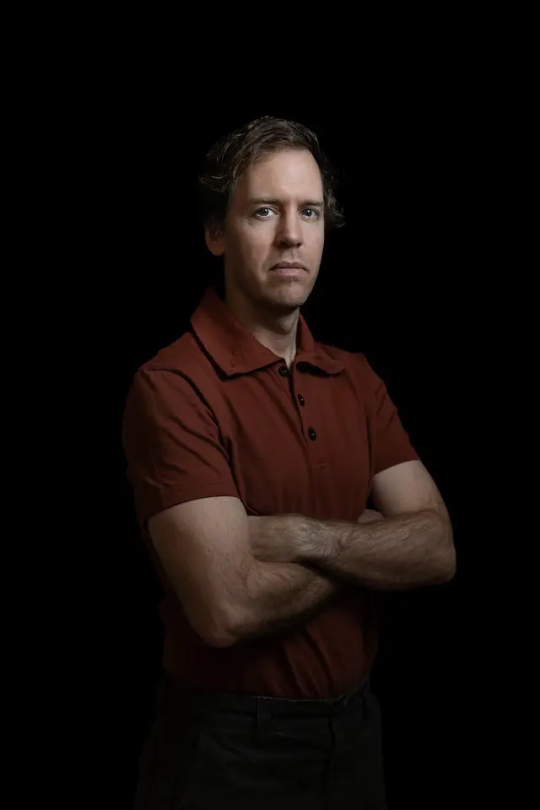

Sebastian Vettel Interview with NRC 🇳🇱 [2025-03-23] English Translation ↴
Sebastian Vettel felt guilty. It was the end of 2020 and he had accurately calculated his carbon output from a season of Formula 1. The conclusion: his footprint was equivalent to that of 40 people.
“I came out to about 400 tons per year. An average person emits about 10 tons, and that's already a problem.”
Vettel, 37, sits in his office in a picturesque northern Swiss village in mid-February. What the village is called, Vettel does not want the newspaper to know because of privacy concerns. From behind his desk, the four-time world champion looks out on snow-covered hills and Lake Constance, which flows into the Rhine nearby. Across the way lies his native Germany.
Half an hour earlier, Vettel arrived in his electric Porsche from his farm, where he lives with his wife and three children. After his F1 retirement in late 2022, he rarely gives interviews. But he does agree to a request from NRC to talk about the unusual transformation he has gone through: he was a Formula One driver, and is now committed to climate change.
As a racing driver, are you credible when you speak out about climate?“People can decide that for themselves. Am I a hypocrite? Yes. Are we all hypocrites? Probably. Is it about not being a hypocrite? Then you should have no footprint at all. That's not doable for myself, nor for virtually all 8 billion other people.”
Somewhere on the bottom shelf of a cabinet in Vettel's office is a figurine shaped like the nose of an F1 car, with an engraved plaque on it: Sebastian Vettel, jüngster Weltmeister. Vettel was 23 when he first became F1 champion in 2010, as the youngest driver ever - a record that still stands. He drove, like Max Verstappen now, at Red Bull Racing, and immediately won another three world titles for that team. In 2015 he left for Ferrari, to bid farewell to Formula 1 at the end of 2022 after two years with Aston Martin. Vettel won 53 races, the fourth highest number in F1 history.
Vettel stood out for more than his performance, in the sport dominated by commercial interests where, apart from Lewis Hamilton, virtually no one touches on social issues. In the final years of his F1 career, Vettel increasingly spoke out publicly about injustices, such as discrimination against LGBTQ. But most of all, he talked about the environment and climate.
He also took action. For example, he gave guest lectures on sustainability to schoolchildren and went into the stands after the British Grand Prix to clean up trash left behind. When Formula One first raced in Miami, he wore a T-shirt warning that that city would be under water in a while. He also offered the shirt for sale in his Web shop; proceeds went to environmental organization Sea Shepherd. Vettel, who earned tens of millions of euros a year in his heyday, also invested in the Swiss company Climeworks, which puts up factories that remove CO2 from the air.
At the beginning of his career, Vettel knew somewhere that there was a problem. Sometimes things struck him, like when he saw firsthand the deforestation in that country around an F1 race in Malaysia. But he didn't think more deeply about it yet: he was young, the future seemed endlessly distant and racing swallowed up all his attention. The birth of his oldest daughter, in 2014, sparked a turnaround.
“Then suddenly you hold the future in your arms. You think: I have to protect this baby. That's when I started to worry. So I started looking into it and looking for a solution. I was in Formula 1, numbers and data everywhere. If the car isn't fast enough, you fix that.”
But addressing climate change is different than making an F1 car three tenths of a second faster, he soon realized. “My first emotion then was: dejection, and a kind of climate anxiety.”
Do you still have that?“Less so. I have much more hope now, after talking to experts and reading up on things. There are many solutions to the problem. We have solar panels, wind power and hydropower. Synthetic fuels for in your car. But the problem is that we still don't feel the urgency enough.”
At the time, did you ever consider stopping racing right away?“Yes. But if I continued, I could make my voice heard more clearly. I did think: I should quit today, and go live in the woods and survive with what I can find there. That's just not going to work. We can't go back. We can fly less, take bicycles instead of cars. Great, I'm all for it. But for the big picture, a lot more is needed.”
Because of that big footprint, would it have been better if you had never become a racing driver? Or do you feel that being able to campaign publicly now outweighs that?“I don't know. If I hadn't raced, someone else would have been in my seat. I want to be modest, but I think I did reach people with my actions and projects. Although there are also plenty who say: it's a hoax. You're a hypocrite, get back in the car and shut up. Fine. Maybe they are afraid of the same things I am, but just express it differently.”
When it dawned on him that he himself was also part of the climate problem, Vettel started “slightly obsessively” keeping track of everything. “Which flights did I take? What rides did I take to the airport, from the hotel to the track? In what kind of car? From what year of manufacture?”
That's how he ended up with 400 tons. “Then you think: you really are a problem for the planet. Then I changed course. I looked at what was worst on my list. I was still flying in private jets then. Was that really necessary? Or could I just get on a scheduled flight with 150 others? Yes, so I stopped private flights altogether. And when I could, I went to races by car. Belgium, Spain. Sometimes also by train. To Italy, for example, when I drove for Ferrari. I said: I take the train, to which they responded: you are a Ferrari driver. Ferrari drivers don't come by train. But I can be stubborn. Long story short: that's how I got my footprint down to 60 tons."
“But of course I was in a privileged position. I made a lot of money, could stop whenever I wanted. Had all the choices. It doesn't work if you start pointing your finger at people who toil very hard to make ends meet and saying, how dare you fly to Thailand? I don't believe in that culture of blaming each other. It's also never going to work to explain to people that they have to give things up.”
Do we have to give things up?“We will have to change. That's what's different. We have to become aware of the problem and understand it. I gave up fast and comfortable travel because I was aware that we have a problem. That's why awareness is so important. But that doesn't mean we should dictate people's choices.”
Does it worry you that that awareness is difficult as more and more people vote for political parties that deny the problem?“Yes. We've made so much progress, and it feels like it's stalled now. That's a danger, and I don't know the answer to it either. All those screamers who shout: follow me, I have the solution, don't let any more foreigners in. Ultimately, I think that comes from insecurity. Yes, we want strong leaders in politics, but we also want leaders who are vulnerable and admit that mistakes have been made."
“I think the younger generation is much more open to that. To give an example, when I raced, we competed super hard on the track. Outside the car you didn't talk to the other person, because that was your enemy. Now they race just as hard against each other, but they go party together the next night.”
"We've made so much progress, and it feels like it's stalled now. That's a danger, and I don't know the answer to it either.”
Now that Vettel no longer drives in Formula One, his life looks a lot quieter. Very occasionally he still shows up in the paddock at a Grand Prix, always to draw attention to a problem he considers important. In 2023, for example, he appeared at the race in Japan because he had eleven insect hotels erected next to the circuit, which he had helped build himself. At the Grand Prix in Saudi Arabia in April, he will host a race for women event.
But otherwise, Vettel is mostly occupied with his family and has far fewer commitments than during his career, when almost every day was filled with racing, training and promotional activities. He no longer races, does not come to his office nearly every day and does not do any other regular work.
After you announced your farewell, you said you were a little afraid of life after Formula One. Is it as scary as you thought it would be?*Laughs* “Well, I don't wake up screaming. But I made a conscious decision not to have anything in my schedule at all, and that is a challenge. The lack of structure. For as long as I can remember, I was always racing. You're still working on things after the season until Christmas, then you have a few weeks of vacation and from January everything starts again. Every year is the same. And besides that, I was used to getting confirmation every two weeks on how I was doing. You drive your lap time, and you know right away how good you are. But of course my wife doesn't give me a printout in the morning saying I was a good husband yesterday."
“I miss racing, but that's more about the competition, the challenge, than the pure driving. I think I've always been a little different, in the sense that I didn't identify as a driver as much as others. When people asked me what I did, I never just said: I drive Formula 1. Maybe I was a bit insecure, I didn't want to brag.”
Vettel can regularly be found in the clay these days: he is completing a one-year agricultural course next summer. “Since the pandemic I am very interested in agriculture, also because of the link between agriculture and climate. Not just of: I like vegetables and I want to grow them myself, but really the Formula 1 approach. There you're always looking for the last bit of performance from your car. Of course, I'm not looking for the last bit of performance from a potato, but I do want to know what the difference is between conventional and organic cultivation.”
Are you going to make that your job?“No, I don't see myself doing that full-time. But I enjoy that it's work that literally puts both feet on the ground. You learn patience, because you really do have to wait for the vegetables to grow. When you work with animals, you don't control everything. I think there are important values in such work, which I would like to pass on to my children.”
He occasionally gives demonstrations in old F1 cars, which he fills up with alternative, more sustainable fuel. This is made using green energy from biomass, as well as CO2 taken from the atmosphere. CO2 emissions are 80 percent lower than regular fuel, but the price is still about three times higher. Starting in 2026, Formula 1 will switch to similar sustainable fuels - and, in addition, half of its cars will be electrically powered.
“Formula 1 has a lot of potential,” he says. “With all the money going into it, the sport can really change. The fact that synthetic fuel is coming next year is a very good step.”
Although F1 is the sport pre-eminently labeled “polluting,” the footprint of Vettel's former biotope is smaller than that of, say, the World Cup. Formula One emitted the equivalent of 223,000 tons of CO2 in 2022, according to a sustainability brief released by the sport last year. FIFA estimated emissions from the World Cup in Qatar that same year were 16 times higher. Race car emissions are negligible - less than 1 percent of Formula One's total emissions. The real climate impact is in the logistics of the championship, with 24 races annually on five continents.
“At the end of the day, it's also not about cars driving around in circles,” says Vettel, ”but about all that travel around the world. Team members going to races. Parts being sent back and forth. The dog-thousands of fans coming to Zandvoort, Monza and Melbourne. How do they get around? Where does their trash go? How will such a race be powered? There are still many challenges there.”
Can all that be done in a sustainable way at all?“It will have to. And that applies not only to Formula 1, but also, for example, to all the concerts that take place week in, week out. We have to learn to think more circularly. Formula 1 can be an excellent example in this regard. It's not the first sport you think of when it comes to sustainability. But it is a global sport that can show people that change is possible.”
The goal of no more than 1.5 degrees of warming from the Paris climate agreement is virtually unachievable. Shouldn't we just ban Formula 1 then?“Fair question. I love this sport, I grew up with it. So very selfishly: it would be a shame if I could no longer watch it in the future. But much more importantly, what about all those kids who now look up to drivers, like I once looked up to Michael [Schumacher]? Who dream of becoming drivers too. Should we crush that dream? I don't think so.”
#I don't even care about the polo I am just looking at those hairy arms#sebastian vettel#ret!seb#rwt!seb#quotes25#2025#caj!seb
233 notes
·
View notes
Text
The Four Horsemen of the Digital Apocalypse
Blockchain. Artificial Intelligence. Internet of Things. Big Data.
Do these terms sound familiar? You have probably been hearing some or all of them non stop for years. "They are the future. You don't want to be left behind, do you?"
While these topics, particularly crypto and AI, have been the subject of tech hype bubbles and inescapable on social media, there is actually something deeper and weirder going on if you scratch below the surface.
I am getting ready to apply for my PhD in financial technology, and in the academic business studies literature (Which is barely a science, but sometimes in academia you need to wade into the trash can.) any discussion of digital transformation or the process by which companies adopt IT seem to have a very specific idea about the future of technology, and it's always the same list, that list being, blockchain, AI, IoT, and Big Data. Sometimes the list changes with additions and substitutions, like the metaverse, advanced robotics, or gene editing, but there is this pervasive idea that the future of technology is fixed, and the list includes tech that goes from questionable to outright fraudulent, so where is this pervasive idea in the academic literature that has been bleeding into the wider culture coming from? What the hell is going on?
The answer is, it all comes from one guy. That guy is Klaus Schwab, the head of the World Economic Forum. Now there are a lot of conspiracies about the WEF and I don't really care about them, but the basic facts are it is a think tank that lobbies for sustainable capitalist agendas, and they famously hold a meeting every year where billionaires get together and talk about how bad they feel that they are destroying the planet and promise to do better. I am not here to pass judgement on the WEF. I don't buy into any of the conspiracies, there are plenty of real reasons to criticize them, and I am not going into that.
Basically, Schwab wrote a book titled the Fourth Industrial Revolution. In his model, the first three so-called industrial revolutions are:
1. The industrial revolution we all know about. Factories and mass production basically didn't exist before this. Using steam and water power allowed the transition from hand production to mass production, and accelerated the shift towards capitalism.
2. Electrification, allowing for light and machines for more efficient production lines. Phones for instant long distance communication. It allowed for much faster transfer of information and speed of production in factories.
3. Computing. The Space Age. Computing was introduced for industrial applications in the 50s, meaning previously problems that needed a specific machine engineered to solve them could now be solved in software by writing code, and certain problems would have been too big to solve without computing. Legend has it, Turing convinced the UK government to fund the building of the first computer by promising it could run chemical simulations to improve plastic production. Later, the introduction of home computing and the internet drastically affecting people's lives and their ability to access information.
That's fine, I will give him that. To me, they all represent changes in the means of production and the flow of information, but the Fourth Industrial revolution, Schwab argues, is how the technology of the 21st century is going to revolutionize business and capitalism, the way the first three did before. The technology in question being AI, Blockchain, IoT, and Big Data analytics. Buzzword, Buzzword, Buzzword.
The kicker though? Schwab based the Fourth Industrial revolution on a series of meetings he had, and did not construct it with any academic rigor or evidence. The meetings were with "numerous conversations I have had with business, government and civil society leaders, as well as technology pioneers and young people." (P.10 of the book) Despite apparently having two phds so presumably being capable of research, it seems like he just had a bunch of meetings where the techbros of the mid 2010s fed him a bunch of buzzwords, and got overly excited and wrote a book about it. And now, a generation of academics and researchers have uncritically taken that book as read, filled the business studies academic literature with the idea that these technologies are inevitably the future, and now that is permeating into the wider business ecosystem.
There are plenty of criticisms out there about the fourth industrial revolution as an idea, but I will just give the simplest one that I thought immediately as soon as I heard about the idea. How are any of the technologies listed in the fourth industrial revolution categorically different from computing? Are they actually changing the means of production and flow of information to a comparable degree to the previous revolutions, to such an extent as to be considered a new revolution entirely? The previous so called industrial revolutions were all huge paradigm shifts, and I do not see how a few new weird, questionable, and unreliable applications of computing count as a new paradigm shift.
What benefits will these new technologies actually bring? Who will they benefit? Do the researchers know? Does Schwab know? Does anyone know? I certainly don't, and despite reading a bunch of papers that are treating it as the inevitable future, I have not seen them offering any explanation.
There are plenty of other criticisms, and I found a nice summary from ICT Works here, it is a revolutionary view of history, an elite view of history, is based in great man theory, and most importantly, the fourth industrial revolution is a self fulfilling prophecy. One rich asshole wrote a book about some tech he got excited about, and now a generation are trying to build the world around it. The future is not fixed, we do not need to accept these technologies, and I have to believe a better technological world is possible instead of this capitalist infinite growth tech economy as big tech reckons with its midlife crisis, and how to make the internet sustainable as Apple, Google, Microsoft, Amazon, and Facebook, the most monopolistic and despotic tech companies in the world, are running out of new innovations and new markets to monopolize. The reason the big five are jumping on the fourth industrial revolution buzzwords as hard as they are is because they have run out of real, tangible innovations, and therefore run out of potential to grow.
#ai#artificial intelligence#blockchain#cryptocurrency#fourth industrial revolution#tech#technology#enshittification#anti ai#ai bullshit#world economic forum
32 notes
·
View notes
Text
little update in the story !
There’s gonna have to be some rewriting to the story. It’s the pacing and flow of this story that I realize needs to make better sense. The change that i’m working with is:
Uluwehi is the founder of a growing gaming and technology studio for some time until years later she becomes a big time CEO of a conglomerate company she initiated. To clarify, Wehi’s investors/higher ups did not hand pick people to work at her studio/company. Uluwehi recruites those who were interested in working with her in large consideration of budgeting (as in how many people she can financially afford to hire and split the revenue. which wasn’t a lot of people in the very beginning. maybe about 10-14.), as well as friends and others who she’d already trusted their skills in to adapt her vision. Uluwehi does the overwhelming majority of the engineering by herself, all of the prototype models/versions as well as their updates. But of course there’s the serialization of the product and its programming, operation, configuration, data, memory, etc… to be discussed with their team of engineers and artists. As well as the teaching of her process. When finalized and troubleshooted, Uluwehi’s products are serialized and mass produced/manufactured to be given to the public.
There is no huge factory for that until later on.
Before putting herself out there, gathering a team and being offered more through networking, there is just scientist engineer Uluwehi building robots and creating worlds in video games all by herself. She believes she can make the world a better place and help people with her intelligence.
That’s to explain Uluwehi’s thing she has going on in the beginning of the story right now before the huge problems/conflict arise or make themselves apparent to the main characters’ viewpoints.
*** Also I’m close to finally finding a name for the story!! I hope to announce it soon when I’m more secure enough about it. I’m so excited!
9 notes
·
View notes
Text
Dean Obeidallah at The Dean's Report:
“The one big thing nobody is talking about: Did Elon want to shut the government down because of his business deals with China?” That was the first line of Rep. Jim McGovern (D-Mass) multi-part statement Saturday posted on Elon Musk’s platform, X--ironically enough. A similar point was also made Friday by Rep. Rosa DeLauro (D-CT)—the ranking minority member of the House Appropriations Committee-in a detailed letter to leaders of the House and the Senate. What was the issue the two were flagging? As Rep. McGovern wrote: “The original funding bill (that he [Musk] killed) included what’s called an “outbound investment” provision—which would limit & screen U.S. money flowing to China. That would have made it easier to keep cutting-edge AI and quantum computing tech—as well as jobs—in America. But Elon had a problem.” DeLauro gave even more context to this provision vetting investments in China: “This outbound investment provision was agreed to after months of bipartisan, bicameral negotiations and years of advocacy from Members of Congress. It would have kept innovation and manufacturing in semiconductors, artificial intelligence (AI), quantum computing, and other cutting-edge technologies in the United States and prevented wealthy investors from continuing to offshore production and U.S. intellectual property into China – benefiting only their bottom lines and the Chinese Communist Party.” But Musk—per these two members of Congress—led the charge to block this proposed legislation because as McGovern accurately noted, Musk’s “second-largest market is China. He’s building huge factories there. His bottom line depends on staying in China’s good graces.” The result was that when the new budget deal was agreed upon Friday, guess what was missing? Yep, the provision that would’ve been bad for Musk’s business deals with the Chinese Communist Party—which is in essence Musk’s business partner as the NY Times detailed earlier this year in an article titled, “How Elon Musk Became ‘Kind of Pro-China.’” (Musk’s exact words.)
Rep. DeLauro explained in more detail the financial incentive behind Musk’s action to block this provision: “Musk’s car company, Tesla has poured billions of dollars into investments in China, particularly its “gigafactory�� in Shanghai. The Shanghai plant is Tesla’s largest car manufacturing facility – the Chinese gigafactory produced about 50 percent of Tesla’s global automobile output over the last year.” DeLauro continued, “And in May of this year, Tesla broke ground on a new $200 million factory to manufacture large batteries critical to its electric vehicle supply chain…Notably, proponents of regulating U.S. investment in China have advocated for the inclusion of large battery manufacturing in the list of technologies subject to outbound investment screening.” Yep, these new law could’ve impacted Musk’s new business venture per DeLauro.
Rep. McGovern also raised concerns about Musk’s future business plans involving China, explaining Musk “wants to build an AI data center there too—which could endanger U.S. security.” Importantly, DeLauro detailed for all to see Musk’s documented personal relations with the Chinese Communist Party, noting, “Musk has ingratiated himself with Chinese Communist Party leadership.” For example, she cited Musk’s close ties with “Chinese premier Li Qiang, who helped rush the construction of Tesla’s Shanghai gigafactory.” DeLauro concluded her letter by writing, “It is extremely alarming that House Republican leadership, at the urging of an unelected billionaire, scrapped…this critical provision to protect American jobs and critical capabilities.” Adding, “This is particularly concerning given Elon Musk’s extensive investments in China in key sectors and his personal ties with Chinese Communist Party leadership, and calls into question the real reason for Musk’s opposition to the original funding deal.”
[...] In fact, even a well-known Republican raised alarm bells about Musk’s loyalty to Beijing. Vivek Ramaswamy--who Trump tapped with Musk to co-head the newly created Department of Government Efficiency--was publicly warning in 2023 that Musk was a puppet for the Chinese Communist Party. As CNN recently reported, Ramaswamy was concerned that “Tesla is increasingly beholden to China,” adding damningly, “I have no reason to think Elon won’t jump like a circus monkey when [China’s leader] Xi Jinping calls in the hour of need.” The GOP silence on Musk’s extensive ties to the Chinese Communist Party is beyond hypocritical given that for years Republicans have slammed China as a threat. For example, in January 2023, the House GOP created “The Select Committee on the Chinese Communist Party” designed to address the “threat posed by the Chinese Communist Party and develop a plan of action to defend the American people, our economy, and our values.” Earlier this year, the House GOP led the charge to ban Tik Tok from having access to the United States--which was signed into law and goes into effect Jan. 19, 2025 unless the Chinese company that owns the social media platform sells it to a non-Chinese company. But when it comes to Musk, the GOP doesn’t care that he has documented ties to top Chinese Communist Party officials.
CCP puppet and de facto “President” Elon Musk helped block the original CR to protect his business deals with the Chinese government, because it had an “outbound investment” provision that would screen any US money sent to China.
#Elon Musk#China#Vivek Ramaswamy#GOP Hypocrisy#Tesla#President Musk#Rosa DeLauro#Jim McGovern#CCP#US/China Relations#TikTok Ban#TikTok#DOGE#Department of Government Efficiency
13 notes
·
View notes
Text
U.E.S.C. Marathon Public Access Terminal 95-w<39.59.19.21> <Data Transfer from Leela>
Host <39.59.19.21>
<Transfer Durandal>
<Error Unknown>
<Interior Error>
***MESSAGE RECEIVED***
Gheritt White had been floating six feet off the floor for three weeks. His feet and hands tingled, and his eyes burned with the flames of a dying fire. He had last heard someone speak to him as the cell door slammed shut. He didn't remember what the uniformed man had said. The words had bounced off the bars of the cell and rang through Gheritt's ears. Gheritt had been talking to himself for the last few minutes, something about getting caught, but then his ears began to tingle just like his hands.
He looked at his hands, but the fire in his eyes made him blink. Tears came, and when he opened his eyes again, his hands had been melted into fleshy pancakes that wafted in the ripples flowing over the fire in his eyes. "Damn cell," he heard someone say. "Last time I had a good meal was three days ago. The food they feed you in here could kill a lab rat."
Rats. He had remembered something about rats. But his ears began to ring again and the voice speaking to him faded off into the background of his mind. In its place, there was a new sound, the clapping of hands together. He blinked hard to made out his hands again. They had disappeared; his arms connected at the wrists.
He thought back to the time he went ice skating on a pond. He remembered the sound of his skates on ice, a gentle scrapping. Scrapping away now inside his ears, trying to tear down his thoughts. There had been a woman with a white fur tube over her hands. Her wrists were like his now. The wrists of someone who had tried too many times to clap his hands. He had been applauding everyone else in life, but never himself. The hands, like himself, had been put into prison, and he didn't know why.
"Can't sleep in here, if the smell of this musty bedroll doesn't make you sick, then the sound of the rats chewing inside the walls will keep you up. You'll wake up from your dreams to their little chomping. Sometimes I think that they are chewing me..." The voice was coming from inside the cell, but Gheritt couldn't see anyone.
Gheritt hadn't always been alone, he could vaguely recall from somewhere inside his broken mind that there had been friends, lovers, murderers.
He recalled a theory he had come up with after a bloody schoolhouse brawl. The theory was simple. At some point in time, everyone was a murderer. Whether or not they ever felt remorse, they had all wanted someone dead. Hatred. Everyone knew the feeling of hatred. Gheritt had known hatred on that schoolyard. His beater had laughed at their bloody faces, a laugh which now echoed through his ears, rhythmically blocking out the other voice in the cell.
The schoolyard was usually a place where Gheritt and his friends would play football or foursquare or something, but today, there was an edge. Maybe everyone had eaten cereal with milk that was about to go bad, or maybe there was too much smoke in the air from the Wheeling hubcap factory. Football had been extremely rough. Gheritt had gone to play foursquare after he got tackled by five boys who weren't his friends. But today, even foursquare had an evil twist. The top square today had become habituated to making fun of the first square.
Gheritt had decided that it was an evil day.
When his beater started to push him around, he exploded. Hatred flowed from his eyes, his hands and feet began to tingle. All of his coordination left him, and his face was beaten to a bloody mess. The schoolyard disciplinarian had been slow to notice the ensuing carnage, and she didn't really care anyway.
Gheritt would have killed him if he could have. He would have torn out the eyes of his beater. He would have made him pay for his abuses. But his hands had begun to tingle. He couldn't feel his feet and he had begun to float off the ground.
Everyone was a murderer, but Gheritt couldn't remember his reason for why that was so. He thought it was something about hands, the passion for justice. His hands and feet had begun to tingle, and he was floating farther off the floor. He looked up from his hands, and he saw the bars of the cell, moving left and right, opening wide and then closing shut like the surf coming up a beach. Every time that he thought he would be safe, the bars crested up, the opening closing, the wave rising, crashing. The result would be the same, he would never escape. The bars would crush him, break his back.
He could feel the roughness of the sand under his palms, for all the motion of the waves around him, his hands had come to rest serenely upon the ocean floor. His body tossed and flipped, pivoting about his hands under which he could feel the safe, coarse sand. The wave crashed one final time, he landed upside down, his hands thrown clear from the sandy bottom, the rush of the water filling his ears, his nose, his mouth, the sound of crashing water cascading down from his feet to his head- penetrating his mind to tear down thoughts. Like the sand castle he had built to withstand the tide, his thoughts came down around him.
Gheritt had a good life, so much time, so much time. He had loved swimming, turning, beating. He had loved the tingle in his hands and feet, his inability to kill his nemesis. Once he had fallen down the stairs, and just for a moment, his hands came to rest on the carpet of the stairs. In that instant, his body had frozen, floating over the stairs, safe from falling, but the moment didn't last. The ocean crashed about him, his hands torn free from the sandy bottom, his body flipping, falling.
But now he levitated farther up, his hands still tingling. He began to float through the bars, he expected the instant of safety as his hands found footing, but that moment did not come, the bars squeezed his body. His chest tingled. As he fell through his cage, his legs tingled. The fire in his eyes had become a cold wind, he blinked away tears. He tumbled through the bars, spinning and turning, he could see a man. In his hand he saw a small white rat. A pounding, the crashing waves in his ears became rhythmical, hard. The man was beating the rat against the floor. Pounding, pounding. Blood covered his hands, the man's hands tingled. He had broken them on the floor of the cell. Disciplinarian, lover, murderer. Gheritt looked back into the cell. He saw himself, disciplinarian, lover, murderer. He had killed his nemesis.
The rat lay dead in his bloody hands. At last, he held the throat of his beater.
He escaped into the waves.
The waves.
***END MESSAGE***
13 notes
·
View notes
Text
Excerpt from this story from Canary Media:
Three days before President Trump took office, an undersea-cable company abandoned plans to build a plant that would employ up to 350 people in Somerset, Massachusetts. Media outlets were quick to spotlight the loss as a specter of what’s to come for the offshore wind industry that Trump put on ice with the stroke of a pen last week.
It’s a reminder that Trump’s attempts to kill the offshore wind industry threaten not just the decarbonization plans of a few states, but job opportunities for a wide array of Americans. In fact, over 64% of the offshore wind manufacturing and supply-chain investments made or announced are in Republican congressional districts, according to data from industry group Oceantic Network.
The 64% statistic describes mostly private investment into offshore wind but also includes some public investment, including money flowing in from the Inflation Reduction Act, the Biden administration’s cornerstone climate law and a favorite target of Trump. In total, $3.4 billion has either been invested in or pledged to Republican districts to build a domestic offshore wind supply chain.
“Who’s benefiting? It’s the entire United States,” said Liz Burdock, president and CEO of the group, which previously went by the name Business Network for Offshore Wind.
But Trump last week signed an executive order that paused the approval of leases, permits, and loans for both offshore and onshore wind energy pending a federal review. The freeze will likely impact projects in earlier stages of development while the nine commercial-scale offshore wind projects that already have federal permits in hand appear safe.
It could also ripple throughout the emerging U.S. offshore wind supply chain. Developers have signed nearly 2,000 supply-chain contracts with manufacturing firms in 40 states, including some that are hundreds of miles from a coastline, like Ohio and Wisconsin.
For example, said Burdock, Italian shipbuilding firm Fincantieri is building customized offshore vessels in Sturgeon Bay, Wisconsin, which is part of a Republican congressional district. And in Houston, Texas — which she called the “engine” of offshore wind manufacturing — multiple companies are adapting technologies used for the region’s offshore oil operations to accommodate offshore wind.
America currently has 73 gigawatts of offshore wind capacity in various stages of development, according to the latest data collected by the American Clean Power Association. Before Trump returned to office, the industry group estimated that offshore wind would support 56,000 jobs by 2030. About a third of those would be operation and maintenance jobs while the vast majority would be direct construction jobs, at least in these early years of the sector.
Only one commercial-scale U.S. offshore wind project is in operation today, but at least five more are under construction, all off the coastlines of Northeastern states.
In addition to the money flowing to manufacturing projects to support these installations, Oceantic reports that offshore wind has spurred $1.8 billion worth of direct investments into updating 21 shipyards and across 12 states, like the St. John’s Ship Building shipyard in Palatka, Florida, which sits in a district that’s been represented by a Republican since 1989.
Thousands of workers are also helping to update 25 ports across the East, West and Gulf coasts that will store massive wind components and safely load them onto vessels that can then carry them miles out to sea for installation. Oceantic reports that a recent revitalization project at a Connecticut port created 400 construction jobs and sourced components from Texas.
7 notes
·
View notes
Text
Personal Branch (Gu Shiye): #1 Hokuriku Winter Storm (北陸風雪) Part 1 | Beyond The World 世界之外

The biting wind howled, and snow fell from the sky in endless sheets.
The black, old-fashioned train emitted a low, drawn-out whistle, slowly decelerating, and finally came to a stop before an antiquated station platform.
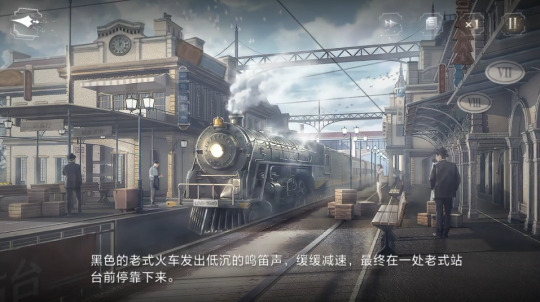
I picked up my suitcase and followed the flow of people off the train.
This world was no longer unfamiliar to me, but this was the first time I had truly set foot on the North Continent.
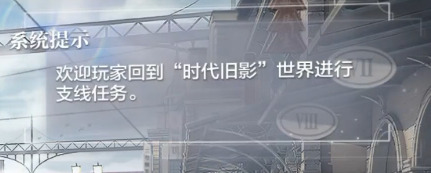
System Notice: Welcome player back to the "Echoes of an Old Era" world for a Side Quest.
As the system transmitted data, the background of this side quest slowly appeared before me—
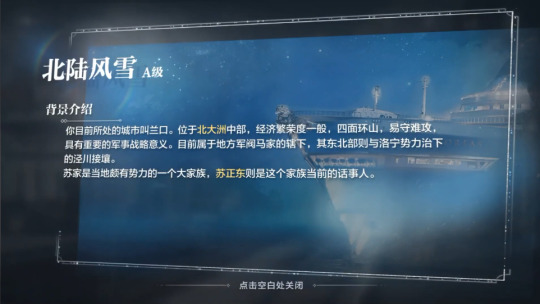
Hokuriku Winter Storm - Rank A Background Information The city you are currently in is called Lankou. It is located in the central part of the North Continent, with moderate economic prosperity. Surrounded by mountains on all sides, it is strategically important due to its defensible position. It is currently under the jurisdiction of the local warlord, the Ma family, with its northeastern region bordering Jingchuan, which is ruled by the Luoning forces. The Su family is a powerful local clan, with Su Zhengdong currently holding the reins of power.
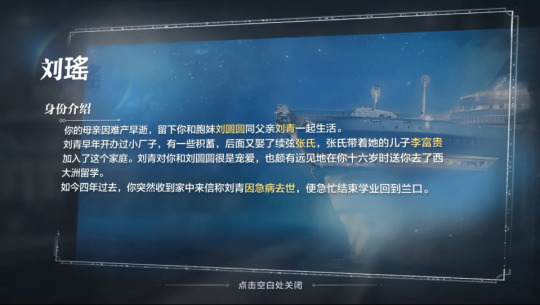
"Liu Yao" Identity Information Your mother died during childbirth, leaving you and your twin sister, Liu Yuanyuan, to live with your father, Liu Qing. Liu Qing started a small factory in his early years, accumulating some savings. He later remarried Zhang, who brought her son, Li Fugui, into the family. Liu Qing doted on you and Liu Yuanyuan, and wisely sent you to study in the Western Continent when you were sixteen. Now, four years later, you suddenly receive a letter from home stating that Liu Qing has died of a sudden illness, and you hastily end your studies to return to Lankou.
As the identity was loaded, I also gained the memories and knowledge that "Liu Yao" should possess.
The timeline here should be about four or five years earlier than the maiden voyage of the Boreas.
I followed the crowd out of the train station, and a man in a blue robe came to greet me.
Blue-robed man: You must be Miss Yao? I am Li Quan, the current house manager, sent by the Madam and the Young Master to take you home.

I remembered that the house manager was Uncle Liu. I didn't know when he had been replaced by this Li Quan, who seemed to be a person of my stepmother and stepbrother.
I frowned and followed him into the car. This mission currently seemed to be directionless, so it was best to continue following the "hints."
-
The car drove for only about ten minutes before stopping in front of a courtyard. It was still the courtyard I remembered from my "memory," but many things were different.
Li Quan led me out of the car and walked inside. Only my stepmother, Zhang, was in the main room.

Li Fugui is working away from home, and my younger sister, Liu Yuanyuan, is only nine years old. She's been sent by my father to the children's school in the city, which is a boarding school, so she usually isn't home.
Zhang spoke for a long time about how much she felt sorry for me being alone outside and how regretful my father's passing was.
But after all, she is my stepmother, and in my memory, she wasn't that close to me, so it was hard to take it to heart. Instead, it felt awkward.
After talking like this for half an hour, she finally had a little servant girl take me back to my room to rest.
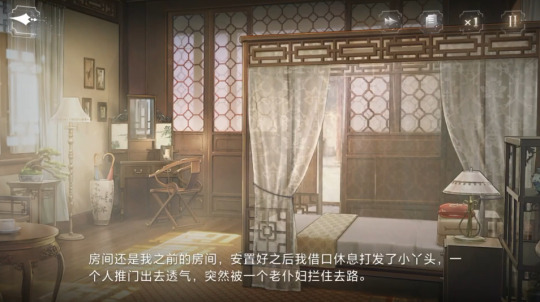
After settling in, I used resting as an excuse to dismiss the little servant girl, then pushed open the door to get some fresh air. I was suddenly stopped by an old female servant.
Lin: Miss! Miss Yao!
It was Lin, the old servant of the house who watched me grow up.
Seeing that I recognized her, Lin quickly pulled me aside.
Lin: Miss, I heard you were arriving today, and I've been waiting here since morning.
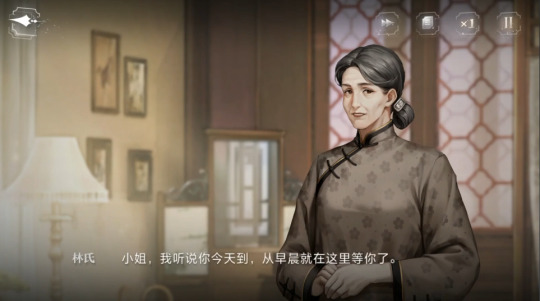
Lin: Miss, you can't come back to this house!
Me: Grandma, don't worry, tell me slowly what's wrong.
She choked up, her face filled with worry.
Lin: Miss, your father passed away last month, and now Zhang controls all the important matters of the house.
Lin: Her son is now working under the Su family's Second Master and is highly valued.
Lin: Miss has no one to rely on. Returning will definitely not be good for you.
Lin: At least half of the family fortune should belong to you, miss, but they definitely don't want to give it up.
Lin: But that's not all...
Lin: I passed by Zhang's room just now, and I heard, I heard that she and her son Li Fugui are planning to marry you into the Su family to please the Su family... A ghost marriage!
After Grandma Lin's explanation, I understood that this "ghost marriage" was a local tradition, which is to marry a living person to a deceased person.
In this chaotic world, feudal superstition isn’t unimaginable. They even gave it such a nice name, as if it could hide its essence.
The Su family is large and powerful. According to the information transmitted by the system, the Su family's Second Master, Su Zhengnan, is also the deputy director of the Lankou City Security Bureau.
In my memory, Li Fugui is uneducated and incompetent. It seems that he used the Liu family's money to get a position in the Security Bureau, and even earned Su Zhengnan's favor.
Obviously, my stepmother and stepbrother wanted to marry me off to a dead Su family member, which could please the Su family and seize the family property, a double-edged sword and a once-and-for-all solution.
Me: Grandma, tell me in more detail, what kind of situation is the Su family in, and why do they need a ghost marriage?
Lin: This has to start more than twenty years ago.
Lin: At that time, the Su family had a Miss Su, who was very smart since childhood. But one year, she was unfortunately kidnapped by bandits to North Mountain.
Lin: Later, after more than half a year, she returned, but she was pregnant.
Lin: North Mountain has always been called "Ghost Mountain," and it is said that there are ghosts hidden inside.
Lin: At that time, people said that Miss Su's pregnancy was ominous, that the child was the son of a ghost, and that she was also sent back by the ghost.
Lin: The Su family felt ashamed of this, so after Miss Su returned, they locked her up and forced her to abort the child.
Lin: I don’t know the inside story at the time. I heard rumors that Miss Su ran away later and eventually died outside.
Me: What does that have to do with the ghost marriage?
Lin: Just recently, Su's Madam always says she sees black shadows swaying outside at night, and Su’s Old Master suddenly fell into a coma, so they found an expert to see—
Lin: The expert said that Miss Su and her child have come back for revenge, and to resolve it, two things must be done.
Lin: The first thing is to rebuild a cenotaph for Miss Su.
Lin: The second thing is that the man should marry, and the woman should be married.
Lin: Miss Su's son should be twenty-three years old if he's still alive. He's fourth in line in this generation. The ghost marriage must be arranged for this Master Su the Fourth, and the partner must be a living person.
Lin: But who in a good family is willing to marry their own daughter in a ghost marriage?
Lin: The Su family looks down on people from poor families, fearing that Master Su the Fourth won't be satisfied, so this matter cannot be resolved…
Lin: Zhang and Li Fugui are no good, so they came up with the idea for you, miss.
Lin: Miss, while it's still early, run away quickly!
I shook my head.
Me: I'm afraid it's too late to run.
That Li Fugui is from the Security Bureau. Besides, they must have controlled Liu Yuanyuan early on. I certainly can't get my sister out of school now.
Moreover... this may be an opportunity for me.
My mission objective is in the Su family.
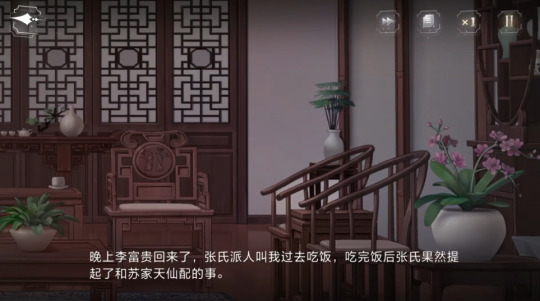
Li Fugui returned in the evening, and Zhang sent someone to call me for dinner. After the meal, Zhang indeed brought up the matter of the ghost marriage with the Su family.
Zhang: Yao, don't be anxious, listen to me.
Zhang: Our family now relies entirely on the little money left by your father. There will be a day when we run out. Yuanyuan is still young, and her future education and study abroad will require a lot of expenses.
Zhang: The Su family is one of the top families in Lankou. Their shops and fields are too numerous to mention.
Zhang: The Second Master of the Su family is the deputy director of the Lankou Security Bureau, and they have influence everywhere in this city.
Zhang: The Third Master of the Su family follows Lord Ma, and his future is limitless. Marrying into their family is good for you and Yuanyuan.
Zhang: So, your brother has finalized this matter with the Su family. The auspicious time is five days later. You can think about it these next few days.
Zhang: We are your family; we would never harm you.
As expected, Zhang and Li Fugui didn't give me any chance to refuse, and used Liu Yuanyuan to threaten me implicitly and explicitly.
Moreover, there were many more servants and maids outside my courtyard, clearly to prevent me from escaping.
But I wouldn't run. After all, I'm a successor to socialism, and I'm not superstitious.
I'd hesitate to marry a living person, but what am I afraid of marrying a ghost?
It's a perfect opportunity to infiltrate the Su family for the mission.
-
Under Zhang's and Li Fugui's tight guard, the five days quickly passed, and the day of the ghost marriage arrived.
The so-called ghost marriage naturally couldn't be held during the day, so the auspicious time was chosen for the evening.
Lankou City has its own unique wedding and funeral customs. That morning, Zhang sent people to forcefully dress me up.

Just after midnight, the Su family's "wedding procession" arrived with the sound of drums and music.
However, unlike a typical wedding procession, this one scattered yellow paper money along the way.
The flower-decorated carriage was piled high with paper flowers and paper dolls. The person riding the horse at the front was dressed in white, holding a black memorial tablet in his hands.
The suona horns wailed and sobbed, sending chills down one's spine.
Master of Ceremonies: The auspicious time has arrived, please escort the bride into the sedan chair—
Two old women supported me, sending me into the bridal sedan. Then, the wedding procession returned to the Su family with the same mournful music.
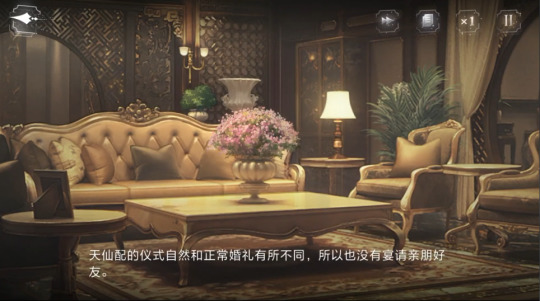
The ghost marriage ceremony was naturally different from a normal wedding, so there was no banquet for relatives and friends.
Upon arriving at the Su family residence, only the Su family and Li Fugui witnessed the ceremony, watching me and this "Fourth Master Su," who was now just a memorial tablet, complete the wedding rites.
I silently recited the core socialist values throughout the entire ceremony.

Afterward, I was sent to the Su family's prepared "Fourth Master Su's" wedding chamber.
The benefits of marrying a ghost became apparent at this moment. The room was quite large, and it was just me and a memorial tablet, so no one dared to disturb me.
I was worried that the Su family might have other malicious intentions, so I kept a Silhouette with defensive capabilities on my person, but it wasn't needed.
-
On the first day of my "honeymoon," I slept until dawn.
I could sense that the Su family was still wary of me, mainly concerned about me running away. Servants followed me wherever I went.
But the Su family was quite superstitious. After all, this marriage involved ghosts and spirits, and they didn't dare do anything to me.
I had been in the Su family for three days, and most people kept their distance from me.
Wherever I went, those prying eyes and whispers followed me like shadows.
But this didn't have a particular impact on me.
In fact, I secretly listened to most of the people's discussions and found that I could deduce a lot of information about the Su family from them.
After some time, I gained a deep understanding of the Su family's situation—
The Su family was originally a local gentry. Their ancestors had served as officials, and they owned both land and shops. Their recent rise in prominence was mainly due to their connection with the local warlord, Lord Ma.
This Lord Ma occupied five cities and the surrounding areas in the central part of North Continent, and had no ambitions for external expansion.
However, it was also difficult for other forces to shake his position. In these five cities, he was basically the local emperor.
However, Lord Ma's residence was not in Lankou, but in another city. Therefore, the Su family, as his confidants, seemed even more powerful in Lankou City.
-
The Su family now had three generations living under one roof. The eldest were the Old Master and the Old Madam, who were quite old and didn't directly manage affairs, but were still the most respected people in the family.
The second generation consisted of five siblings. The eldest, Su Zhengdong, was the head of the family, managing all its affairs.
The second, Su Zhengnan, was the current director of the Lankou Security Bureau.
The third was the legendary Miss Su, who had passed away. Her son was my "deceased husband," Fourth Master Su.
The fourth, Second Miss Su, had married a high-ranking official under Lord Ma's rule and was currently not in Lankou.
The fifth, Su Zhengbei, worked in Lord Ma's Lankou garrison and was also a leader.
The third generation was about the same age as me, with six or seven people in the Su family.
My "deceased husband" was ranked fourth in the Su family, so he was called Fourth Master Su.
-
This time, the system still didn't specify a time limit for completing the mission. It could be inferred that although the mission only required punishing Su Zhengdong.
The Su family was united, and except for the deceased Miss Su, they all probably had problems.
Now that I was in the Su family, I would definitely be able to discover their hidden issues over time, which wasn't difficult. The difficult part was how to bring them to justice—
The law and order in the five cities under Lord Ma's rule were deteriorating. Even if the evidence was solid, it would be difficult to bring down the Su family without Lord Ma falling.
I had to think of a way.
-
In this way, I unknowingly stayed in the Su family for half a month, gaining a deeper understanding of the place.
This morning, I woke up from my sleep and faintly heard the noise outside.
I got out of bed and opened the window, only to find that it was snowing outside.
The world was a vast expanse of white, with pure white snowflakes falling and accumulating into a thin layer on the ground.
It was the first snow of winter.
I closed the window and lit incense for Fourth Master Su's memorial tablet, as usual.
Suddenly, there was a knock on the door.
Servant: Fourth Madam, the First Madam wants you to go to the front.
Me: Okay, just a moment.
In all this time, the Su family rarely asked me to do anything specifically, treating me almost like I was invisible, except when worried that I would escape.
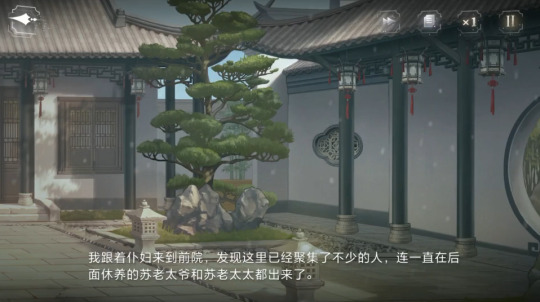
I followed the servant to the front yard and found that many people had gathered there. Even Old Master Su and Old Madam Su, who had been resting in the back, had come out.
A young man stood in the center of the front hall. He was tall and slender, with a handsome and well-defined face.
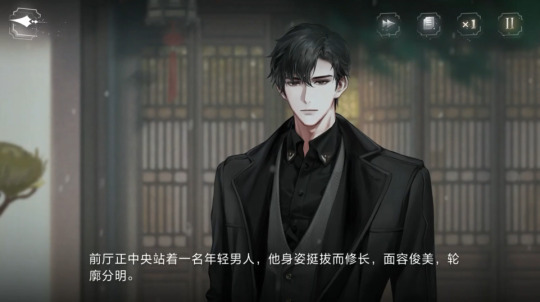
A few snowflakes fell on his eyebrows and eyelashes, quickly melting into fine droplets of water.
The hall doors were open, and he stood sideways, with swirling white snowflakes behind him.
He wore a black overcoat, and his dark eyes reflected the endless wind and snow, yet they seemed even colder than the ice and snow.
He looks a little familiar.
At this moment, the man slowly spoke, his voice clear and cold—
???: My mother was Su Xihe. I have come to visit my maternal grandparents' family according to my mother's last wish.
Miss Su's given name was Su Xihe.
Me: ...
I thought I married a ghost, and now you're telling me he's alive?
I've been burning incense for half a month.
The man before me clearly looked exactly like Mr. Gu Shiye, whom I met on the Boreas, except he appeared younger.
His identity was clearly...
How did he become Fourth Master Su now?
He turned his head to look at his attendant, who took out a jewelry box from his pocket and opened it to show the hall—inside was a red jade lotus pendant.
Old Madam Su exclaimed.
Old Madam Su: That's right! This is Xihe's pendant. She wore it from childhood and never took it off!
She then asked the young man about his birthdate, and it matched as well.
The old couple were merchants in Luoning, with considerable family wealth and no children of their own, so they had taken Miss Su as their adopted daughter.
Fourth Master Su took his mother's surname, and was named Su Shi.
Now that the old couple and Miss Su have passed away, he inherited and expanded their family business, and returned to visit his maternal grandparents' family according to his mother's last wish.
The Luochuan River is the most famous river in the North Continent. It originates from the snow-capped mountains in the west of the North Continent, flowing eastward and surging into the North Sea in the east.
It connects the water trade on both sides of the east and west, nurturing the industrial and agricultural production on both sides of the river.
The entire river basin and its surrounding areas are collectively referred to as the Luochuan region, which is under the jurisdiction of the Luoning forces.
The Gu family, who controls the Ice Sea Fleet and the powerful Luzhou Army, is behind the Luoning forces.
I had heard about this when I was on the Boreas, and I had heard people mention it many times after setting foot on the North Continent.
And Luoning is the capital of the Luoning forces, the most prosperous and developed city in the North Continent.
Su Si's attendant was obviously very knowledgeable about Luoning and was very familiar with the life of Miss Su.
*"Su" here is the surname, "Si" here means four, as he is the fourth son/master in the family.
Seeing that their clothes and attire were different from ordinary people, and after asking a few more questions, the Su family confirmed the identity of this Fourth Master Su. No one present raised any objections.
The Su family also engaged in business, but could only operate within the five cities under Lord Ma's control, unable to expand to other regions.
They were probably tempted when they heard that Su Si had factories and shops in Luoning and had connections in the other three continents.
The Su butler enthusiastically introduced Su Si to the Su family members one by one: "This is your maternal grandfather, the Old Master. This is your maternal grandmother, the Old Madam..."
After going around the circle, it was my turn in the crowd.
Those deep dark eyes looked at me, calm and cold.
Su Butler: Fourth Master, this is the Fourth Madam.
Su Butler: That is... your wife.
Su Si's dark eyes swept over me, and the Su butler stammered, not daring to continue speaking for a moment.
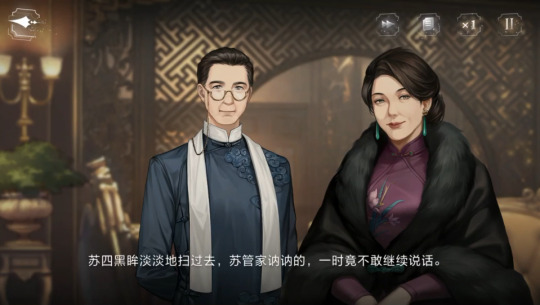
First Madam Su: This matter... how should I put it, well....
First Madam Su: When you didn't return, we all thought something untoward had happened to you and Xihe out there.
First Madam Su: The Old Master and Old Madam felt sorry for you being all alone, so they chose a marriage for you.
As she spoke, she looked at me.
First Madam Su: Yao is a girl from the Liu family. She has a good temperament and personality, and she studied in the Western Continent. We chose her carefully for you.
Fourth Master Su still looked at me without speaking.
First Madam Su suddenly seemed to remember something.
First Madam Su: ...Fourth Master, have you... already started a family in Luoning?
Fourth Master Su finally spoke, his voice as always clear and cold—
Fourth Master Su: No, I haven't.
First Madam Su seemed to breathe a sigh of relief and started talking about other household matters.
-
The courtyard I was living in was the "honeymoon suite" that the Su family had prepared for Fourth Master Su. Now that Fourth Master Su was alive and back, he was naturally arranged to stay here as well.
Gu Shiye's expression remained calm, as if this sudden marriage had not caused any ripples in his heart.
He silently followed the Su butler back to my room, with his attendants following behind.
After entering the room, his gaze fell on the memorial tablet on the altar, then turned to me.
Even upon seeing his own memorial tablet, he remained composed and indifferent.
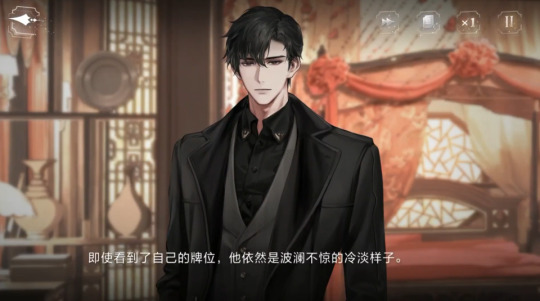
Gu Shiye: What are your thoughts right now?
Me: .....
What can I think? I have only one thought.
Socialism is good, and arranged marriages are terrible.
I told "Fourth Master Su" the whole story of this ghost marriage.
Gu Shiye: Hmm, I guessed you weren't willing.
Me: I only agreed to marry a ghost.
We spoke almost simultaneously. Gu Shiye raised his eyes and glanced at me.
Gu Shiye: My purpose here is to see the Su family, and I have a business deal to settle. I will leave after the business is done.
Gu Shiye: You should keep things calm these days and not cause trouble. Once I'm done, I will take you and your sister away. You can do whatever you want then.
His words meant that Gu Shiye naturally didn't acknowledge this bizarre marriage. He wouldn't make things difficult for me. Instead, he would plan a good future for me and free me from the Su family and Zhang's control.
It would be wrong to betray this kindness, but correspondingly, my time to stay in the Su family to collect clues had been shortened.
Me: How long will your business take, Fourth Master?
Gu Shiye turned his head, silently watching the quiet snowfall outside the window.
A teacup sat on the indoor table, the rising steam slowly ascending, creating a thin white mist. Through the mist, his eyebrows and eyes appeared somewhat hazy.
Gu Shiye: ... It will be settled within two months.
Me: Okay.
Within two months, I had to thoroughly understand the situation of the Su family.
-
With the real Fourth Master Su's return, the memorial tablet was naturally removed. A spare storage room next door was cleaned and converted into his study.
Gu Shiye showed no expression and never revealed whether he was satisfied or not. He wasn't picky about his accommodations. After the study was cleaned up, he moved in, leaving the bedroom for me.
Actually, when I realized it was "Mr. Gu," I was somewhat relieved—if it was him, even if he came back to life, he wouldn't do anything improper.
After Gu Shiye returned, the obvious benefit was that the Su family relaxed their control over me. They no longer watched me every moment to prevent me from escaping, and I had more freedom of movement.
Sometimes, when Gu Shiye went out to "discuss business," I could follow him. After leaving the Su family, we would tacitly part ways—
He remained as cold as ever, not asking what I was doing, and I didn't ask what business he was doing.
I didn't understand why at first, until one day I overheard two servants chatting—
Servant A: You don't have to follow the Fourth Madam anymore?
Servant B: Follow what? She was married here in a ghost marriage before. What normal young woman would agree to that? Of course, she'd be prevented from running away.
Servant B: Now that Fourth Master Su is back, look at his talent, his appearance, his demeanor.
Servant B: I heard he has big business in Luoning, bigger than our master's. No wonder the master and his wife have been so respectful these days.
Servant B: Although he always has a cold face, who wouldn't be tempted by such a catch? It's a much better match than a regular arranged marriage. Of course, they don't have to worry about her running away anymore.
Servant B: You just watch. She's been so happy these days. There's no sign she wants to run.
Me: .....
...I'm on a mission, it's not what you think...
...I'm a serious player...
-
Although it was a ghost marriage and we didn't go through a proper wedding ceremony, in the eyes of the Su family, Fourth Master Su and I were a couple.
The Su family was an old-fashioned, three-generation family, but usually, each branch lived separately.
So, for daily meals and living, only Gu Shiye and I settled things in our own small courtyard.
Gu Shiye didn't know what he was busy with outside, often returning very late, but sometimes he would come back earlier and have dinner with me.
Although his demeanor always subtly revealed a nobility that ordinary people didn't have, he wasn't picky about food.
He usually didn't talk much. Sometimes he'd listen to me, occasionally responding with a quiet "hmm," and sometimes we'd just sit in silence until we finished eating and went back to our rooms to rest.
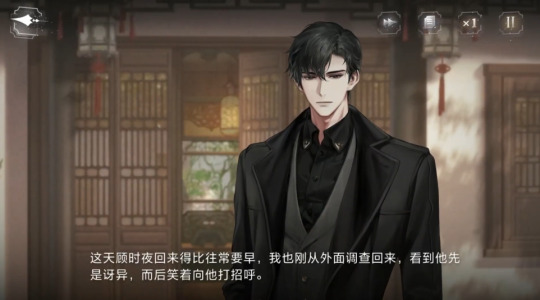
Gu Shiye returned earlier than usual that day. I had also just returned from an investigation outside, and I was surprised to see him, then greeted him with a smile.
Me: Si Ge, have you eaten?
*"Si" here refers to four, as he is the fourth in line, while "Ge" means "brother," as it is often used to address another male who is slightly older than you. It's essentially just a nickname.
Gu Shiye: Not yet.
Me: The kitchen is preparing braised cabbage with potatoes and cold tofu salad for dinner. If you're eating here, they'll add a plate of smoked meat. How does that sound?
Gu Shiye: That's fine.
Gu Shiye: When I'm not here for meals, don't skimp on yourself.
Me: I know.
I wasn't the real Miss Liu, who was being bullied and plotted against by her family. I wouldn't mistreat myself.
Usually, the kitchen prepared dishes I liked. I only asked for lighter meals these past few days because I was feeling a little under the weather.
He looked at me, seemed to consider something, then lowered his eyes and casually added.
Gu Shiye: I can afford to feed you.
Me: I don't need you to feed me.
I replied subconsciously and looked up at him. After saying that, Gu Shiye still had a calm expression, showing no hint of teasing or joking.
Gu Shiye: Hmm.
Gu Shiye: Whatever you want.
Just then, the food was ready, and the cook brought it out and placed it on the dining table.
Lankou is in the north, and it was close to winter, so there weren't many choices of vegetables and fruits. Basically, just cabbage and potatoes.
The cook's skill was also average, just home-style braising.
Sometimes even I lost my appetite eating the same dishes, but Gu Shiye wasn't picky about food, and ate almost anything that was served.
He ate with his usual expression, cold-faced and deep-eyed, and didn't speak. His eating manners were elegant, yet he ate quickly.
I had only taken two bites of my steamed bun when he had already finished two.
And his appetite was quite large. As long as he was there, there would be no leftovers from the dishes the kitchen prepared.
But looking at his almost 1.9-meter height, and remembering that he got up early every day for morning exercise.
His morning exercise was long-distance running around the city. And looking at his lean and strong build after he put on his clothes, this appetite seemed normal.
Me: Si Ge, if you're not busy in the future, try to come back for meals.
Gu Shiye: Hmm, why?
Me: Eating with two people is always better than eating alone.
Me: And home-cooked meals are always better than eating out. If there's anything you want to eat, tell me in advance, and I'll arrange for the kitchen to prepare it.
Gu Shiye: Hmm.
He didn't mention this matter to me again, but he almost always came back before dinner time.
Occasionally, when he couldn't make it back, he would ask his butler, Lu Quan, to come back and tell me.
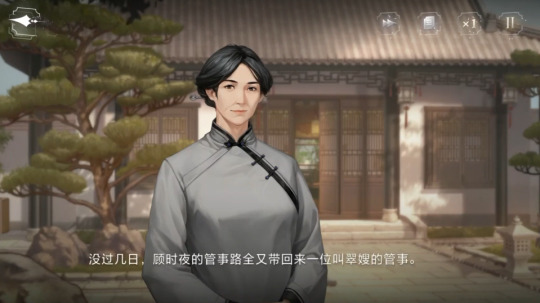
A few days later, Gu Shiye's butler, Lu Quan, brought back another housekeeper named Cui Sao.
Cui Sao looked to be in her forties, tall and very slender, extremely taciturn, but efficient in her work.
I discovered that the housekeepers Gu Shiye chose, like him, spoke very little, understanding the principle that silence is golden.
After Cui Sao arrived, the people sent by the Su family were basically replaced, and she took charge of everything inside and out.
I still often used shopping as an excuse to go out and investigate the Su family's affairs. Cui Sao would follow, but she was like a transparent person who dutifully performed her role, barely noticeable.
She didn't care what I was doing, often keeping a conscious distance, yet paying attention to my movements—as if she was protecting my safety.
After collecting a considerable amount of new information, I decided to summarize it and make further plans.

After a month of targeted investigation, I uncovered many previously unknown facts.
There was a mining area near Lankou, belonging to Lord Ma, but managed by Fifth Master Su, Su Zhengbei.
The managers exploited and oppressed the miners at every level. The mining conditions were extremely poor, essentially a one-way trip, and over time, no one was willing to work in the mines unless they had no other choice.
The Su family devised many schemes, such as forcibly collecting land rent. If farmers couldn't pay, they would seize their fields.
They would then force the farmers to owe the Su family a huge debt, which they would have to repay by working in the mines. If they refused, they would be arrested and sent to the Security Bureau.
The same schemes were used against small businesses in the city.
The ultimate result was that hardworking people lost their livelihoods, owed debts to the Su family, and were left with the choice of dying in the mines or in the Security Bureau.
The Su family paid a lot of tribute to Lord Ma. It was obvious who was backing them, as the mines served Lord Ma's interests.
These things weren't unknown, but there was nowhere to turn for justice, and no one to manage them—the perpetrators and the law enforcers were one and the same. Where could one seek redress?
The more I investigated, the more I felt that while it was easy to gather evidence of their crimes, it would be difficult to bring the Su family to justice.
Gu Shiye was also very efficient. In this month, he had opened a shop in Lankou, specializing in goods from the Eastern, Western, and Southern Continents.
Lankou was located in the central plains and had little interaction with other continents, so people were very interested in these imported goods.
Gu Shiye's shop had a wide variety of goods, and it quickly gained popularity. As the Lunar New Year approached, business was booming.
-
The Su family now saw Gu Shiye's capabilities, and they treated him even more diligently.
But this also created a problem. After seeing Gu Shiye's ability, the Su family began to try to control him.
Since they couldn't think of a good way, they decided to target the people around him.
We were still living in the Su family, and it was no secret that Gu Shiye and I slept in separate rooms, with him in the study and me in the bedroom.
The Su family used both soft and hard tactics. First Madam Su and Old Madam Su "chatted" with me every day, subtly and overtly inquiring about our situation.
First Master Su and Second Master Su tried to "introduce" suitable girls to Gu Shiye.
-
That evening after dinner, Gu Shiye looked at me for a long time.
Me: Si Ge, is there something wrong?
Gu Shiye: I want to move back into the bedroom.
He said calmly.
Gu Shiye: The Su family's interference is troublesome. If you're unwilling, I'll think of another way.
I understood. The Su family still needed Gu Shiye, and he didn't want to alert or alarm them.
He found their interference bothersome, but couldn't sever ties with them immediately. The easiest way was to pretend to be a loving couple.
The entire Liu family was under the Su family's control. In their eyes, controlling me, an orphaned girl, was no problem.
By controlling me, they could control Gu Shiye.
While I couldn't understand the Su family's naïve and shameless thinking, I understood that their logic probably worked that way.
What I could think of, Gu Shiye naturally understood as well. Other methods were available, but none were as simple as this.
Me: Of course, it was your room in the first place.
Regardless of other things, even if we didn't count our time on the ship, Gu Shiye and I had been working together on this mission for so long. I trusted his character.
Seeing Gu Shiye's usual cold and indifferent face, I suddenly wanted to tease him.
Me: I'm already married to you.
Me: Even my person is yours, Si Ge. Do you still need my permission to sleep in my room?
Gu Shiye glanced at me upon hearing this.

Gu Shiye: Do not speak recklessly.
Me: How can it be reckless? We have performed the wedding rites.
I looked at him with a smile.
I remembered when I was on the Boreas, when I knew nothing, Gu Shiye said that we had performed the wedding rites.
Looking back now, although it wasn’t completely false, the tables had finally turned, and it was my turn to tease him.
Gu Shiye was silent.
After a moment, he turned and went out, silently leading Lu Quan and Cui Sao to move things from the study to the bedroom.
I wanted to go help, but Cui Sao stopped me.
Cui Sao: Madam, please rest. The boss doesn’t want you to do anything.
I looked towards him, and Gu Shiye nodded slightly.
Gu Shiye: It’s not much, I don’t need your help.
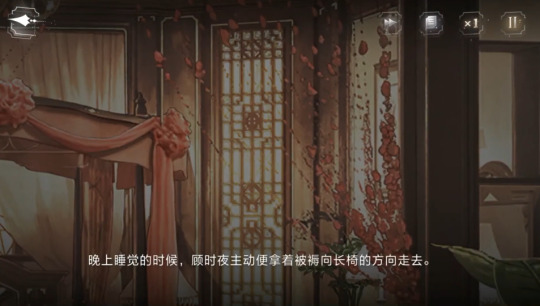
When it was time to sleep that night, Gu Shiye took his bedding and headed towards the long chair.
I hesitated for a moment and moved towards the inside of the bed.
Me: Si Ge, come sleep here.
Me: It's cold on the long chair.
Everything else was fine, but the weather in Lankou was already very cold.
Here, they used heated "kang" beds, so the bed was warm at night, but everywhere else was bitterly cold, and even thick blankets were hard to warm up under.
Gu Shiye paused at my words.
Gu Shiye: It's fine.
Me: Just come over. There's enough space for two on the bed. Besides, don't you have things to do in Lankou? It wouldn't be good if you caught a cold and it affected your business.
Me: I won't be able to sleep well if I'm worried about you.
Gu Shiye: Mm.
I don't know which sentence moved him, but Gu Shiye agreed and came over with his bedding, sleeping in the space I had left for him.
He slept very properly, facing upwards, with his legs stretched straight. I suddenly felt the bed was a bit too short.
Gu Shiye: Sorry for the inconvenience.
Me: It's no inconvenience.
Even if we disregarded everything else, I didn't feel inconvenienced, considering Gu Shiye's appearance alone.
Gu Shiye: I've asked Lu Quan to look for a house. We'll move out in a few days.
Me: Okay.
Gu Shiye: Okay, sleep.
Several more days passed, and I gradually got used to sharing a room with Gu Shiye.
-
During dinner one evening, Gu Shiye had his usual calm expression, but I could sense he seemed to be in a better mood than usual.
Me: Did something good happen?
Gu Shiye turned to look at me, and rarely, he spoke up—
Gu Shiye: Due to war preparations, trade from Jingchuan to Lankou is very inconvenient. All goods must go through layers of inspection and exploitation to enter Lankou City.
Jingchuan was already under Luoning’s jurisdiction. The Gu family was so powerful, they had been able to defend Lankou until now due to it's naturally defendable geography, which was advantageous to the Ma family's military.
It was normal for Lord Ma to be wary of them, and coupled with the corrupt officials in Jingchuan, trade between the two places was certainly not convenient.
Gu Shiye: I promised Su Da (First Master Su) to build an entertainment club in Lankou, modeled after the most popular styles in Luoning, with all the investment from me.
Gu Shiye: The Su family will help find land and drum up business, giving them sixty percent of the profits. They helped me get through the checkpoints for bringing in goods.
Gu Shiye's black eyes looked at me, and he suddenly looked away, slightly uneasy.
Gu Shiye: ...So, there have been several batches of new goods in the shop recently. You can go take a look if you have time, see if there's anything you like.
Me: Okay.
Collaborating with the Su family and doing business in Lankou was undoubtedly a dangerous game.
It was evident from Miss Su that the Su family didn’t care about family ties. Gu Shiye didn’t seem like he would not know this.
Moreover, on the Boreas, he went by the surname Gu.
Me: Si Ge.
Gu Shiye: ... Hmm?
He looked up at me, a rare hint of surprise in his eyes.
Me: Be careful.
Gu Shiye lowered his eyelids, tapped his fingers lightly on the wooden table, and responded softly.
Gu Shiye: Mm.
Gu Shiye, seemingly lost in thought, suddenly looked up at me again.
Gu Shiye: New Year's is coming soon. When do you have time to go out with me to buy some things?
I was a bit puzzled.
Me: We have everything we need at home. Why do we suddenly need to buy things?
Gu Shiye: It's not about what we lack.
Gu Shiye: Every year before the New Year, my father and mother would always go out to buy some New Year's goods.
I thought he told Old Madam Su that he and Miss Su were adopted by an old couple, but he never mentioned having a father.
I was more and more convinced that Gu Shiye was impersonating the real Fourth Master Su.
I turned to look at him, and he seemed to realize he had let something slip, turning away and saying nothing.
I had no intention of exposing him. I simply cooperated and let this topic pass, pretending not to notice the loophole in his words.
Me: I have plenty of time. Just let me know when you're available, Si Ge.
Gu Shiye: Mm.
-
After returning to the room that night, I reflected on the day and realized that Gu Shiye probably already knew something was amiss with me.
My current identity was his "wife," a woman confined to the inner quarters, ostensibly with nothing to do.
He specifically asked about my time, probably because he already knew I was secretly investigating the Su family.
Of course, Cui Sao was his person. It would have been strange if he didn’t know what I was doing.
I turned my head to look at the man sleeping soundly beside me and closed my eyes.
This unspoken agreement to ignore each other's suspicious behavior was a tacit understanding between us.
-
Gu Shiye did choose a day to go out with me to “buy things.”
But we hadn't decided what to buy, so we were just walking aimlessly on the street.
The most popular place in Lankou City right now was Gu Shiye’s "Luochuan Trading Company.”
As we walked up to the storefront, we could see the shoulder-to-shoulder crowd inside the glass windows.
Me: Your shop is doing great business, Si Ge.
Gu Shiye lowered his eyes and looked at me calmly.
Gu Shiye: Want to go in and take a look?
Me: Okay.
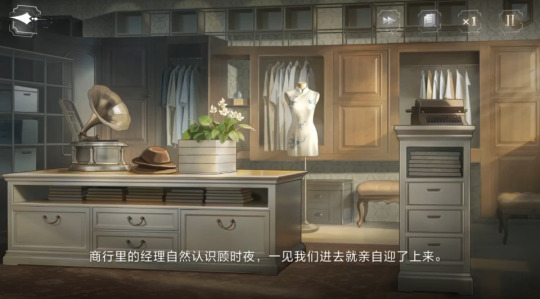
The manager of the trading company naturally recognized Gu Shiye and personally came to greet us as soon as we entered.
Manager: Fourth Master.
He turned to look at me, somewhat uncertain.
Manager: And this lady is?
Gu Shiye: My wife.
The manager immediately put on a smile and looked at me enthusiastically.
Manager: So you are Madam. Why didn't you say you were coming in advance? I would have had them prepare some fine items for you.
Me: No need to trouble yourself, I'm just looking around.
Although I said that, the manager still followed us closely, two steps behind.
I picked up an emerald brooch and had only glanced at it twice when the manager quickly approached to explain.
Manager: Madam has a good eye. This is a top-quality emerald imported from South Continent, meticulously carved by the best craftsmen in Luoning, taking half a year to make.
Gu Shiye gave him a light glance.
Gu Shiye: Wrap up what Madam chooses.
Gu Shiye: You don't need to follow us.
Manager: Ah, yes, yes.
I watched the manager back away, feeling that his attitude towards Gu Shiye was a bit excessively cautious and reverent.
Ordinary shopkeepers and bosses wouldn't act like this, let alone the head manager of such a large trading company.
Gu Shiye: You can continue looking.
Me: I don't need these things, Si Ge.
After all, I couldn't take these gold and jade jewels with me when I left this world.
Gu Shiye seemed to think for a moment before continuing.
Gu Shiye: I want to give them to you.
It was still the same cold and indifferent tone, like giving a battle order.
I smiled.
Me: Then I'll choose a gift for Si Ge too.
I picked and chose in front of the counter, and finally selected a watch with a black face.

The style of this watch is considered very fashionable in Lankou, but most people can’t afford it due to the price.
The salesperson took the watch out and handed it to me. I lowered my head and asked Gu Shiye to raise his hand. I personally fastened the watch on his wrist.

Me: Wishing Si Ge peace at all times, and success in everything.
Gu Shiye: Mm.
His dark eyes looked down at me.
Gu Shiye: Wearing it outside might damage it. I probably won’t be able to wear it all the time. But I’ll keep it safe.
Me: As long as Si Ge likes it. Of course, you can wear it however you like.
I knew his true identity, and I knew he often fought in battles, so any accessories might be inconvenient to carry.
But suitable gifts for him were probably hard to find in Lankou City.
Me: If there’s an opportunity in the future, I’ll pick out other gifts for Si Ge.
Gu Shiye: Alright.
-
When we came out of the trading company, it was snowing. Before long, a thin layer of white had accumulated on the ground.
I turned to look at Gu Shiye beside me. The snow fell on his shoulders, blurring the street behind him.
I suddenly thought of the scene when I first saw him that day.
Me: Si Ge.
I reached out my hand to him.
He turned his head to look at me too, his expression still calm, but at that moment, he seemed to suddenly come to life.
I remembered that I was wearing a brightly colored dress today, and his black eyes seemed to reflect my color.
Gu Shiye: What’s wrong?
Me: You have snow on you.
I raised my hand and brushed the snowflakes off his eyebrows.
But as I withdrew my hand, he grasped my wrist.
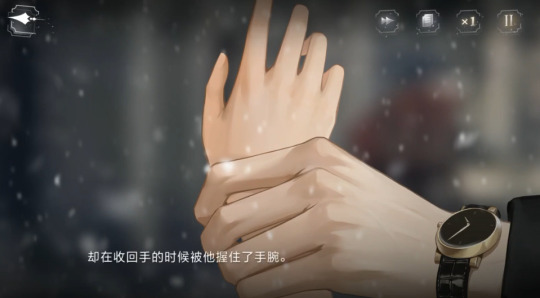
Gu Shiye: It’s snowing, let’s go back.
But he never let go of my wrist.
Me: Si Ge.
He turned his head to look at me calmly.
Gu Shiye: The roads are slippery when it snows.
That day, we walked back to the small courtyard in the snow.
Lu Quan drove, following us slowly all the way.
The roads were slippery, and the snow never stopped.
He held my wrist all the way—only letting go for a moment when he took off his coat and draped it over me.
-
Gu Shiye’s entertainment club began preparations in full swing.
Gu Shiye said that local Lankou workers lacked vision and corresponding skills.
He brought in a design team of more than ten people and recruited many batches of workers from Luoning.
The inspection of people from Jingchuan was very strict here. Initially, these people also relied on the Su family’s connections.
Later, Gu Shiye’s people became acquainted with those in charge, so they no longer had to rely on the Su family. A greeting from the shop manager was enough to let people in.
"Master Gu is a member of the Su family, well-known to us. He’s just doing some business. What’s the problem?"
As the Lunar New Year approached, Gu Shiye rented another residence near the shop and moved me out of the Su family residence.
Although Gu Shiye’s surname was now Su, according to Lankou’s tradition, he wasn’t considered a proper Su family member. Doing this was only natural.
When leaving, I heard the Su family’s servants whispering as they helped us move things—
Servant: First Madam chose a great marriage. Fourth Master looks cold and aloof usually, but he’s actually very good to Fourth Madam. He’s clearly satisfied with this marriage.
Me: .....
I turned my head to look at Gu Shiye. His five senses were so sharp; he had obviously heard it too.
His face remained impassive, but he wouldn’t look at me, as if nothing had happened.
Noticing that I had fallen behind, he paused, but still didn’t turn back, only looking at the distant trees.
Gu Shiye: Let’s go.
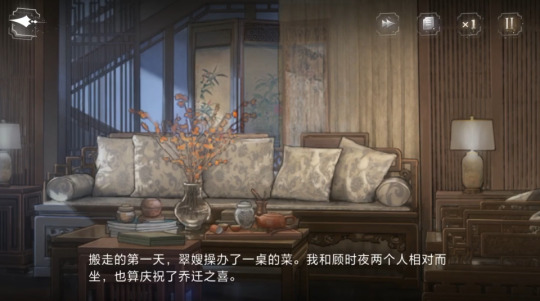
On the first day of moving, Cui Sao prepared a table full of dishes. Gu Shiye and I sat facing each other, celebrating our housewarming.
However, now that we had left the Su family, Gu Shiye and I naturally had separate bedrooms again, and wouldn't be sleeping in the same room.
My room was meticulously arranged, and the bed was more comfortable than the one in the Su family residence, but on the first night, I wasn't used to it and ended up having insomnia.
The next day was the twenty-fifth day of the twelfth lunar month. In the afternoon, Cui Sao brought back a timid little girl. Based on my memory, I immediately recognized her as my younger sister, Liu Yuanyuan.
Cui Sao: New Year’s is approaching, and the boss guessed that Madam would like to see her relatives, so he asked me to bring Miss Liu over.
I knew that Gu Shiye’s subordinates called him boss. But even if Cui Sao hadn’t said it, I could have guessed it was his idea.
Liu Yuanyuan stood in front of me, cautiously raising her head to look at me.
Clearly, the little girl was exhausted from the journey.
But the feeling of seeing her own flesh and blood was overwhelming. After she recognized my appearance, she threw herself into my arms and cried.
I comforted Liu Yuanyuan for a long time. It wasn’t until evening that I entrusted her back to Cui Sao and returned to my room.
As soon as I closed the door and sat down, I looked up and saw Gu Shiye pushing the door open and walking in.
He was wearing a black coat, bringing in a chill with him.
With no attendant present, he took off his coat and hung it up himself, walking up to me and stopping, lowering his eyes deeply.
Gu Shiye: I have to go out to discuss a business deal these next few days, so I won't be returning.
Gu Shiye: While I'm away, you and your sister stay at home. Cui Sao will be here with you. Don't go out unless it's absolutely necessary.
Gu Shiye: ...When I come back, I'll take you wherever you want to go.
Sure enough, after having dinner with me that day, Gu Shiye went out again.
And he didn't return for several days, all the way up to New Year's Eve.
In addition to Cui Sao, there was also a team of "guards" in the courtyard. Cui Sao said the boss had left them to protect us.
-
Gu Shiye hadn't returned on New Year's Eve. After I had dinner with Liu Yuanyuan and put her to sleep, I sat alone in the room waiting.
Suddenly, a loud "boom" sounded, and an even bigger explosion came from the north, followed by several more loud noises.
I was startled. I opened the door to look, and saw Cui Sao carrying the sleeping Liu Yuanyuan over. She put the child in my room, then turned to face me.
Cui Sao: Madam, it seems to be a bit chaotic outside. You should stay here and don't go out. If you're bored, I can play chess with you for a while.
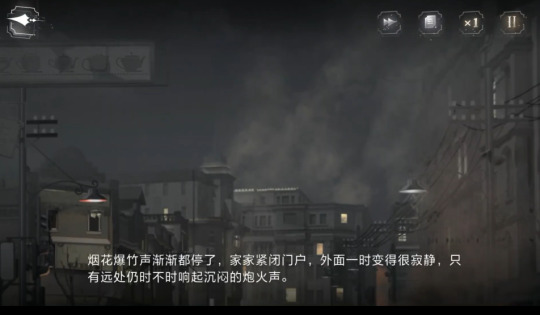
The sounds of fireworks and firecrackers gradually died down, and every household tightly closed their doors. The outside became very quiet for a moment, with only the occasional muffled sound of gunfire echoing from afar.
Cui Sao found a set of Go-moku from somewhere and actually played with me.
This winter night seemed particularly long and quiet. Sometime later, fine snowflakes began to fall outside the window, and the horizon faintly turned white with the dawn.
I heard people shouting outside—
Passerby: The city guards have mutinied! The Luochuan army has entered the city!
Passerby: Jingchuan has fallen! The black Luochuan troops have taken control of all parts of the city!
I pushed open the door and went out. This time, Cui Sao didn't stop me. She silently took my cloak and put it on me.
The rumors from outside were apparently true.
Through the courtyard wall, I could see teams of disciplined soldiers marching by outside. Their actions were orderly, and their demeanor was resolute, a world apart from the original Lankou garrison.
I walked to the courtyard gate, and Cui Sao stepped forward and opened it.
-
The street was quiet. The sky was still covered with a hazy gray. Looking left and right, all the other houses had their doors and windows closed. The windproof lamps at the entrances cast faint light on the ground.
The sound of horses' hooves striking the ground rang out. I looked towards the end of the long street, following the sound—
A team of Luochuan soldiers was walking towards us. The leading man was riding a horse, holding the reins lightly, with a straight back, calm yet imposing.
He rode his horse towards me, snow sprinkling on his chest and shoulders, his black cloak billowing behind him.

The black steed stopped in front of my door, with a loud, drawn-out neigh.
He sat on the horse, unmistakable in his black military uniform, the emblem of the Luoning forces on his epaulet reflecting the light of the fresh snow.
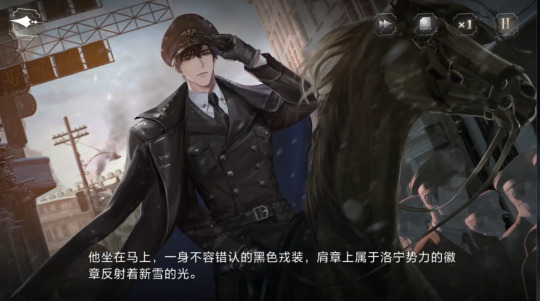
He lowered his head slightly to look at me, one hand gripping the reins, the other pressing down on his military cap.
Those dark eyes were as cold and calm as when we first met, but I could see my own reflection in them.
Gu Shiye: I'm back.
Gu Shiye: Also, my surname is Gu.
Gu Shiye: My name is Gu Shiye.
In the distance, sporadic gunshots sounded, and the red clouds reflected the firelight.
I remembered him telling me that he had a business deal to settle and hoped to finish it within two months.
It turned out that this "business deal" was the change of ownership of this city.
The Luochuan army quickly took control of the situation in Lankou City.
As long as Lankou was in their hands, other places would be even more vulnerable, like taking something out of a pocket. It was only a matter of time before Gu Shiye took over the entire central five cities.
I knew that now was the perfect time for me to expose Su Zhengdong's crimes.
-
Su Zhengdong was finally unable to withstand the overwhelming evidence.
Soon after, key members of the Su family and former subordinates of Lord Ma in Lankou City were all detained and put on trial, judged and punished according to the Luoning forces' laws.
This task, which once seemed so difficult, was, thanks to Commander Gu, much easier to solve than I had imagined.
.
.
.
.
.
Gu Shiye Personal Branch Part 2
If you'd like to support my translations and read them DAYS before they are published on this Tumblr, consider joining my Patreon!
Alternatively, feel free to leave me a tip here or buy me a coffee through the "Leave a Tip" button on my navigation bar. Thank you for all your support!
3 notes
·
View notes
Photo

New Post has been published on https://www.vividracing.com/blog/craziest-sounding-porsche-981-boxster-with-vr-tuned/
Craziest Sounding Porsche 981 Boxster with VR Tuned

When you think incredible exhaust sounds, you usually think of a Ferrari V8 or V12. You must definitely would think of a Lamborghini Huracan V10 or Murcielago V12. But would you have thought of a Porsche Boxster with a 2.7L 6cylinder flat-6 engine? Well that is what this has with some upgraded parts from us here at Vivid Racing. This Porsche Boxster if from the 981 generation which was produced from 2012 to 2016 as a 2.7L and 3.4L except the GT4 which was a 3.8L. This was the final year the Cayman and Boxster would be a Normally Aspirated engine as in 2017 the car chassis was changed to the 718 and became turbocharged. As an NA motor, the sounds produced from the flat-6 engine had an incredible tone, but was harder to gain performance compared to the turbo models. To further enhance the usual docile sound of a Cayman/Boxster to meet the needs of the general population, this Porsche was upgraded with a complete straight pipe exhaust system and a VR Tuned ECU Flash.
youtube
Exhaust systems for the Porsche Boxster 981 are designed to increase torque and help it breath to keep pulling to redline. To achieve this, you must do a header and muffler setup. Most 981 exhaust systems feature new over axle pipes which eliminate the 2nd catalytic converter. The primary catalytic converter is on the headers and when you do this as a full race setup, the sound and performance comes alive! There are many popular brands when it comes to doing an exhaust on the Porsche 981 Boxster or Cayman. This includes systems from companies like Armytrix, Soul Performance, Capristo, AWE, and others as seen here – https://www.vividracing.com/index.php?keywords=Porsche+981+exhaust. Because most of these exhausts are modular to work with the stock headers, you can mix and match brands between the exhaust and headers depending on price. If you need to maintain your factory emissions, then we recommend getting a set of headers with high flow cats. These will still help improve performance and sound, but not be as loud as a straight piped exhaust.


Improving the cars horsepower and torque as well as throttle response is easily done with our VR Tuned ECU Flash. ECU Tuning is a simple process that requires reading out the cars original file via the OBDII port, making changes to map data that alters things such as fuel, timing, and throttle maps, then flashing this back to the vehicle. VR Tuned handles all of this for you via an easy to use and convenient tool so you can do this via the comfort of your own garage. With our 10+ years in Porsche tuning, we have proven maps that take into account your car stock or modded with common upgrades such as exhaust, intake, throttlebody, or headers. VR Tuned can do other options for customers on their Porsche ECU such as Pops & Bangs as shown on the video. This option gives you the “crackle” sound on deceleration and with the straight pipe exhaust will shoot flames as well. With the device we provide, this includes your original file so you can flash back to stock at anytime if needed. An ECU Tune for the Porsche 981 Boxster/Cayman is one of the best mods you can do to really liven up the driving the experience! You can view all of the Porsche 981 ECU Tuning Options Here – https://www.vividracing.com/index.php?keywords=vr+tuned+porsche+981

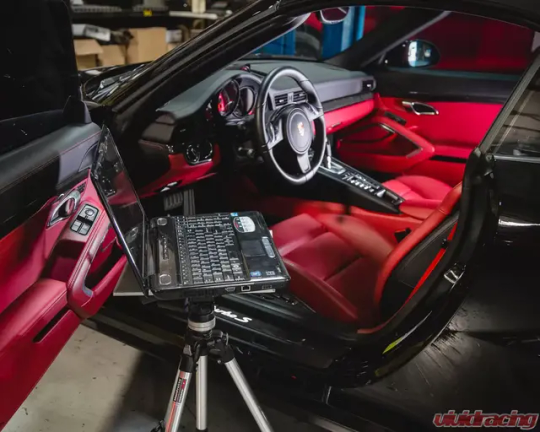

2 notes
·
View notes
Text

Indeed, plumbing has evolved significantly, especially in the commercial industry, thanks to the integration of AI, machine learning, and predictive analytics. These technologies have brought about several advancements and complexities in plumbing systems and operations:
Predictive Maintenance: AI and machine learning can analyze historical data and real-time information from plumbing systems to predict when maintenance or repairs are needed. This predictive approach reduces downtime and costly emergency repairs.
Smart Sensors: IoT (Internet of Things) devices and sensors can be embedded in plumbing systems to monitor various parameters, such as water pressure, temperature, and flow rates. This data can be processed by AI systems to detect leaks or other issues in real-time.
Energy Efficiency: AI-driven systems can optimize water usage and heating in commercial buildings, reducing energy consumption and costs. They can adjust water temperatures and flow rates based on usage patterns and weather conditions.
Water Quality Monitoring: AI and machine learning can continuously monitor water quality and detect contaminants, ensuring that water in commercial facilities is safe for consumption and use.
Leak Detection: AI can identify small leaks and potential problems early, preventing major water damage and reducing water wastage.
Remote Monitoring and Control: Building managers and maintenance personnel can remotely monitor and control plumbing systems through AI-powered interfaces, allowing for quick responses to issues.
Demand Forecasting: Predictive analytics can help businesses anticipate their water and plumbing system usage, allowing for efficient resource allocation and cost savings.
Customized Solutions: AI and machine learning can tailor plumbing systems to specific commercial needs. For instance, restaurants, hotels, and factories may have different plumbing requirements, which AI can adapt to accordingly.
Data-Driven Decision Making: Plumbing systems generate vast amounts of data, which can be used to make informed decisions about maintenance, upgrades, and resource allocation.
Compliance and Regulations: AI can assist in monitoring and ensuring compliance with plumbing and environmental regulations, reducing the risk of fines and penalties.
While these technological advancements have made plumbing systems more efficient, cost-effective, and environmentally friendly, they also require specialized knowledge and expertise to implement and maintain. Additionally, cybersecurity becomes a crucial consideration to protect these systems from potential threats. As a result, the plumbing industry has seen an increased demand for professionals who are well-versed in both traditional plumbing skills and modern technology applications in plumbing systems.
8 notes
·
View notes
Note
PLEASE get started on the boiler and buildings please please please please
The buildings: The cogs have to fight the shopkeepers to take over the building, and presumably they have to advertise the new business and do other official stuff because they're cogs (leasing, renting, the deed to the land, cleaning fees, etc) since they're using buildings as workspaces. But have you ever noticed the cogs in the background, in cubicles? That's right, that's even more overworking for the cogs. You can see cogs working diligently in the cubicles or cogs that are clearly having a mental breakdown due to burnout, stress, etc. This tells us that the cogs themselves don't even enjoy all this work, and even if they do, it kills them. We could actually be doing them a favor by destroying them how we do, because gags are designed for laughter, and cogs essentially can't laugh or don't in public if they can help it due to the company (C.O.G.S INC), pressuring them to make the company look better. We could actually be giving them a laugh, but they have to keep working and unfortunately, laughter destroys them.
And the field offices?? There's even more overworking in there! They have stamper equipment and it's being overseen by those cogs you fight on the stamper floor! They're not qualified for the job, you would expect a foreman to be there at least since they're made to oversee factories and factory-like functions, but it's just security cogs. Not only is this a big workplace safety issue, but it's a lot of pressure on those cogs. And I assume they're stuck doing administrative work on that security cameras floor we fight them at. Random cogs were appointed to high pressure positions that they weren't designed for. They're robots and sure there's like 4 of them, but they still have a lot of pressure to make sure toons don't break in, more so than other cog buildings. They call extra cogs from their work desks too. There's no way that when you get randomly called from your desk, that you and your coworkers don't know you've been selected to be destroyed. Same to cog buildings, it's a random selection of destruction.
And the boiler? They didn't ask to be here, they were created for the sole purpose of making the sellbots even more money. They're a newer cog and have way less experience than the other cogs because there's always thousands of them getting data on the world and more. The boiler is basically a child compared to the rest of the cogs! And they've got a bunch of anger issues, literally having a meltdown mode, AND they're stuck at the top of a field office! They're not allowed to go anywhere like other cogs, they're just at the top floor until we come along and destroy em. They may be the boss but even cog building bosses have more freedom! The cog building bosses have seen the world before, and they kinda chose to take over a building, but the boiler has never seen the outside world for themself, or be able to be there. The only information of the outside world would come from their subordinates, but everyone's so focused on work anyways, and it'd make the company look bad if the boss had time for sentiments like the outside world. They've got dozens of robots at their beck and call but none of them are really there for them. They're just a victim of cog nation's profits, made only for more profit and data processing power (why they have all those PowerPoints ready to buff up the cogs), and no wonder they're mad all the time, they literally watch the day go by them as there's a clock above the elevator, right in their line of sight. They watch cogs clock in and out, and their day is a blur. I had the theory that maybe they had ADHD (I'm always looking for ADHD in media xd) mainly because the clock never moved, they're always stomping on things in the fight (others said it's to stay alive and it might be part of that, but cog nation is advanced enough to just have a constant flow of fuel to them), they literally have a meltdown mode, and like a neurodivergent child, angry a lot and also defensive of themselves, with a strong sense of what's right or wrong, hence why they're fighting so hard, it's partially their job, but really, the toons did break into the field offices first. I used to say to them stuff like they're mad that the VP, their parent, didn't love them, and honestly it might be true. The boiler is really only there for profit, not even being respected like the original four cog bosses, just there to make more profits. In fact, from the little I know from Sellbot taskforce tasks, the other cog factions like cashbots and lawbots hate this business of the field offices, because it inconveniences them. The boiler is widely hated now, by toons and other cogs.
#rainbowrosegames speaking#the boiler#ttr boiler#ttr field offices#Toontown rewritten field offices#toontown rewritten#toonblr#toontown cogs#the cogs#toontag
12 notes
·
View notes
Text
7 QUALITY CONTROL TOOLS FOR PROCESS IMPROVEMENT
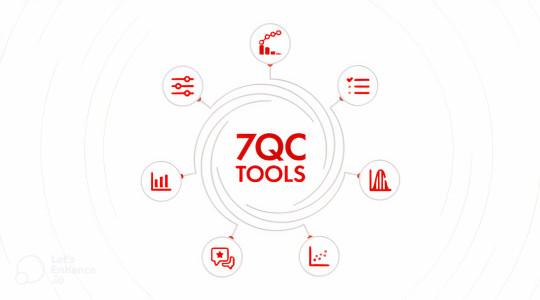
“As much as 95 per cent of all quality-related problems in the factory can be solved with seven fundamental quantitative tools.”
-Kaoru Ishikawa, The inventor of Fishbone Diagram
In today’s customer-centric market, quality is an integral factor in the growth and sustainability of any business. Businesses go the extra mile to provide the best and excellent customer experience to ensure customer satisfaction. Hence, efficient quality management which has the highest impact on customer experience is one of the most essential features for any business.
Introduced by Kaoru Ishikawa, the seven basic tools of quality also known as 7QC tools are very effective in quality management and quality assurance process. So, businesses who want to ensure competitive and excellent quality of their products and services can utilize the proven 7QC tools for structuring a strategic plan for quality improvement.
LIST OF 7 QC TOOLS
Cause and Effect Diagram
Cause and Effect Diagram also known as Fishbone Diagram helps in identifying the potential causes of an effect or a problem. In addition to sorting ideas in respective categories, it also helps in understanding the areas of opportunity through effective brainstorming. Fishbone training empowers you to identify the potential cause in the problem.
Control Chart
Control charts are used to study how the processes have changed over a period of time. Further, by comparing current data to historical control limits, one could lead to the conclusion about whether the process variation is consistent as in under control or unpredictable as in out of the control due to being affected by special causes of variation.
Pareto Chart
Pareto Chart is based on the 80/20 rule where it shows the significant factors that have the highest impact on the identified problem.
Check Sheet
Check sheet is a structured process which helps to collect and analyzing data. It is an effective tool that can be for a variety of purposes.
Histogram
Histogram is commonly used a graph that shows the data and its frequency of distribution to help users identify each different value in a set of data occurs.
Scatter Diagram
Scatter diagram shows the relationship between two important factors i.e. pairs of numerical data, one variable on each axis to demonstrate the relationship.
Stratification
Stratification also known as a flow chart or run chart is a technique that separates the data gathered from a variety of sources so that patterns can be seen i.e., the path an entity has taken through a defined process.
Utilizing the 7 QC tools in six sigma or quality management process helps in taking a systematic approach to identify and understand the risk, assess the risk, control fluctuation of product quality and accordingly provide solutions to avoid future defects.
WHEN SHOULD YOU USE 7 QC TOOLS?
7 QC tools can be carried out during the quality management, quality improvement process, six sigma implementation processes or even the regular PDCA cycle for the quality purpose for enhanced quality management.
In the first phase of measuring and identifying, Fishbone Diagram also known as cause and effect diagram, Pareto Chart and Control Chart can be utilized. In the next phases of assessment and analysis, Scatter Diagram, Histogram and Checklist can be carried out. The Control Chart can be utilized consistent quality improvement.
BENEFITS OF 7 QC TOOLS
The 7 QC tools are structured and fundamental instruments that help businesses improve their management and production process for achieving enhanced product quality.
From assessing and examining the production process, identification of key challenges and problems to controlling the fluctuation present in the product quality and providing solutions for prevention of defects in future, the easy to understand and implement, 7 QC tools are very effective. Some of the major business benefits of 7 QC tools are listed below.
Provides a more structured path for problem-solving and quality improvement
Easy to understand as well as implement yet extremely effective
A scientific and logical approach for problem-solving
Follows the 80/20 rule i.e. gain 80% result with 20% efforts
Improve the quality of product and services
Helps in identifying and analyzing problems during the process
Fishbone training aides in root cause analysis and problem-solving
Encourages team spirit and fosters a healthy culture
Identifies roots cause and solve it permanently
Enhance customer experience and customer satisfaction
Based on the data-driven process and customer-centric approach, 7 QC tools implementation is one of the most effective processes that too in the shortest amount of time.
4C team of certified professionals has provided 80+ implementation of 7 QC Tools and 120+ 7 QC Tools Training. By solving 200+ quality problems, 4C has empowered clients to reduce the 80% cost of poor quality. To accelerate your quality management process and reduce your cost of poor quality, contact our experts now.
#iso certification#iso certification consultants#iso consultancy#iso consultant#iso certificate online#iso certification in india
3 notes
·
View notes
Text
dCS Factory Visit!
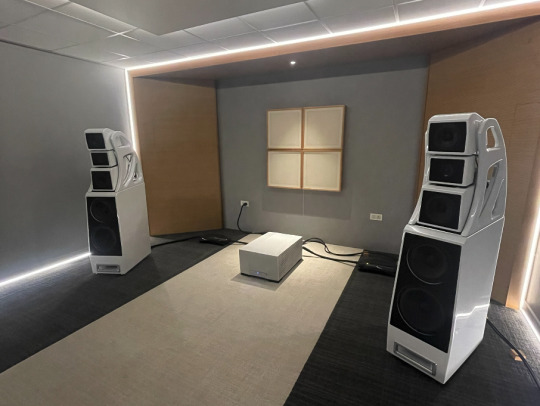
Hi All,
Just a quick blog to share a recent factory visit to dCS! A legendary audio company based in Cambridgeshire and known for its unwavering commitment to sonic purity. To be invited behind the scenes and to witness the inner workings was nothing short of awe-inspiring.

Opening the door to the factory revealed multiple engineers passionately working on a wide range of products which go through the most rigorous testing and measurements before reaching our ears! As a mere mortal, I could not help but feel that understanding the intricacies of the complex engineering employed at dCS required an electronics degree or its equivalent, but I certainly learnt a lot! dCS understands that achieving sonic perfection requires a holistic approach.

Their meticulously engineered transports minimise jitter, allowing the digital data to flow flawlessly. Their master clocks synchronise the entire audio system and eliminate timing discrepancies that may compromise the audio quality. Adding an upsampler enhances the resolution and detail of what you are listening to, and at the heart of all this lies their groundbreaking Ring DAC technology. Combine these components, and you enter the territory of sonic bliss!

After lunch, we stepped inside the listening room, which I have to say looked and sounded incredible. We started with the entry-level Lina Dac and clock, which boasts an impressive pedigree and a level of performance that would be adequate for the most seasoned listener. I was impressed by Lina's stunning clarity and depth, and the Separation was second to none producing a very natural soundstage. If that wasn't enough, we moved onto the pinnacle of dCS's engineering and demoed the Vivaldi DAC, which delivered an unparalleled level of refinement and finesse that was simply breathtaking.

A thoroughly enjoyable day spending time with some of the best audio equipment available in the world of hifi today. dCS's relentless pursuit of sonic excellence is evident in every aspect of its creations, ensuring that music lovers can listen to their favourite songs in the most accurate and captivating way possible.
We have the full dCS range available to demo at HFL! Do feel free to contact us to arrange a demonstration. I'd also recommend checking out dCS's website to learn more about the history of the company and the products they make. Links below👌
https://hifilounge.co.uk/product-category/brands/dcs/
Thanks,
Billy


3 notes
·
View notes
Text
Yup.
There is a huge rush in data center technology companies right now to secure decade long contracts for the development of certain technologies to increase massive transfer rates in data centers, ostensibly because AI is going to be the next big thing.
No one sane is doing regularly renewing contracts though. (At least, so far. We'll get to that). And there is a reason for this. Because these companies remember the .com crash and how what fiber companies thought were stable and reliable orders from tech companies suddenly dried up and left them in the lurch, with all of this research investment and facility development suddenly not making anything profitable.
But of course the lesson they took from that isn't that backend R&D and production tech companies shouldn't get on board with tech bubbles. It's that they need to get in on the scam. If the big tech giants need to make a public show of faith in AI, offer them big long-term contracts which they can't turn down without compromising on their public display of faith, or rely on them having drunk their own kool-aid.
The problem is that to do that, even the back end tech companies have to make a public show of faith in the value of AI down the road, which means hiring and promoting believers. Which means drinking the Kool-Aid. Which means suddenly they're not so in on the scam anymore.
The thing is, it's easy to imagine being the company selling shovels in a gold rush. You say, we're just going to invest in one shovel factory, and only if it would be profitable even if the gold rush ends in a year or two. But mmmm, you're not just selling people shovels, you're selling them on uprooting their whole lives for a gold rusb. It's hard to sell people that when it looks like you've got one foot out the door.
So the board and the execs make a tech futurist position and staff it with an AI devotee. Pay for a genAI program made just for their company and put out an email hyping it up to middle management. Pay for a few nonsense projects about AI they can hype to investors. But of course those projects are only going to be staffed by people guzzling Kool-Aid because everyone else knows they're career killers.
And suddenly the rot is inside the house. The only thing execs know is what they're told from the bottom, and they just replaced their whole flow of information about AI with a mix of convincing grifters and delusional fools. So before long the company is just another gold rusher, selling assets to invest in shovel factories.
I think that if the bubble doesn't pop quick we're going to see a lot more backend tech companies signing on rather than playing it safe with decade long contracts, and it's going to get really ugly when the bubble finally goes. Because those companies aren't too big to fail, but they often represent even more of a bottleneck on (not bubble) production capacity and monopolize even more critical institutional knowledge then the front facing tech giants do.
so like I said, I work in the tech industry, and it's been kind of fascinating watching whole new taboos develop at work around this genAI stuff. All we do is talk about genAI, everything is genAI now, "we have to win the AI race," blah blah blah, but nobody asks - you can't ask -
What's it for?
What's it for?
Why would anyone want this?
I sit in so many meetings and listen to genuinely very intelligent people talk until steam is rising off their skulls about genAI, and wonder how fast I'd get fired if I asked: do real people actually want this product, or are the only people excited about this technology the shareholders who want to see lines go up?
like you realize this is a bubble, right, guys? because nobody actually needs this? because it's not actually very good? normal people are excited by the novelty of it, and finance bro capitalists are wetting their shorts about it because they want to get rich quick off of the Next Big Thing In Tech, but the novelty will wear off and the bros will move on to something else and we'll just be left with billions and billions of dollars invested in technology that nobody wants.
and I don't say it, because I need my job. And I wonder how many other people sitting at the same table, in the same meeting, are also not saying it, because they need their jobs.
idk man it's just become a really weird environment.
33K notes
·
View notes
Text
How Low Capacity Utilisation Affects the Economy: Insights from India’s Industrial Sector

Capacity utilisation is a vital indicator of economic health and industrial efficiency. It measures how much of a country's or a firm’s productive capacity is being used at a given time. A high capacity utilisation rate implies robust demand and efficient production, while low capacity utilisation points to underperformance, excess capacity, and weak economic momentum.
In India, the industrial sector forms the backbone of economic development. However, in recent years, the sector has struggled with persistently low capacity utilisation across key industries. This underutilisation not only hampers productivity but also has far-reaching effects on employment, investment, profitability, and the broader economy.
Let’s explore what low capacity utilisation means, why it occurs, and how it impacts India’s economic landscape.
What Is Capacity Utilisation?
Capacity utilisation is calculated using the formula:
Capacity Utilisation (%) = (Actual Output / Maximum Possible Output) × 100
For example, if a factory has the capacity to produce 1,000 units but is only producing 700 units, its capacity utilisation rate is 70%. In most economies, a rate of 80–85% is considered optimal for sustained profitability and growth.
In India, the Reserve Bank of India (RBI) tracks capacity utilisation data, especially from manufacturing firms, through its OBICUS (Order Books, Inventories and Capacity Utilisation Survey). This data is used to assess industrial health and guide monetary policy.
Current Trends in India’s Capacity Utilisation
According to recent RBI data, India’s average capacity utilisation in manufacturing hovers between 70% and 75%, often falling below the desired 80% mark. Several sectors, such as capital goods, infrastructure-related industries, and textiles, have shown lower utilisation levels due to demand fluctuations, policy uncertainties, and supply chain disruptions.
The COVID-19 pandemic and global economic slowdown further intensified the problem, with many industries operating at less than half their potential during peak lockdown periods. Even post-pandemic recovery has been uneven, with small and medium enterprises (SMEs) still struggling to reach pre-COVID output levels.
Economic Impact of Low Capacity Utilisation
1. Reduced Investment and Delayed Expansion Plans
When existing capacity isn’t fully utilised, businesses are less likely to invest in new plants, equipment, or technology upgrades. This leads to:
Sluggish capital expenditure (CapEx) across the economy.
Delays in job creation and innovation.
Lower long-term productivity growth.
For a developing economy like India that relies heavily on industrial expansion for GDP growth and employment, this is a significant bottleneck.
2. Job Losses and Employment Stagnation
Low production levels mean fewer working hours and job opportunities, particularly in labor-intensive sectors like textiles, construction materials, and automobile manufacturing. This slows down formal job creation, increases informal employment, and puts pressure on household incomes and consumption.
3. Lower Profit Margins and Financial Stress
When businesses operate below capacity, fixed costs like rent, maintenance, and salaries remain constant, but revenues fall. This compresses margins and can lead to:
Debt servicing issues.
Defaults, especially among smaller enterprises.
An increase in non-performing assets (NPAs) in the banking sector.
As a ripple effect, this also discourages credit flow into the industrial sector, further dampening growth.
4. Impact on Inflation and Monetary Policy
Low capacity utilisation can have mixed effects on inflation. While excess supply may keep prices in check, the lack of productive efficiency can raise input costs per unit, particularly in sectors dependent on imported raw materials. Central banks, like the RBI, often look at utilisation rates before making decisions on interest rates, liquidity, and credit growth.
The Way Forward: Improving Capacity Utilisation in India
To address this persistent issue, India must adopt a multi-pronged strategy:
Boost domestic demand through fiscal stimulus, infrastructure development, and public procurement.
Improve ease of doing business to attract private investment.
Promote exports through trade agreements and competitive manufacturing.
Support MSMEs with access to credit, technology, and training.
Government initiatives like Make in India, PLI (Production Linked Incentive) schemes, and Atmanirbhar Bharat are aimed at addressing these gaps, but successful implementation is key.
Conclusion
Low capacity utilisation is more than just an operational issue—it’s a macro-economic red flag. For India to achieve its goal of becoming a $5 trillion economy, it must ensure that its industries run closer to full potential. A sustained increase in capacity utilisation will not only enhance productivity but also drive employment, income growth, and economic stability.
It’s time for coordinated action from policymakers, industry leaders, and financial institutions to unlock India’s full industrial potential.
0 notes
Text
Empowering Smart Industry with Switches & Transmitters
In the fast-paced world of industrial automation, accuracy, safety, and real-time communication are non-negotiable. At Dropship Automation Solutions, we supply the building blocks of modern factories—components that bridge mechanical systems with digital intelligence. In this blog, we explore two critical elements—Industrial Switches and Process Transmitters—that bring responsive control and precise monitoring into automated operations.
From detecting system events to transmitting live process data, these devices drive smarter workflows and safer environments.
1. Industrial Switches: Enabling Responsive Control
What Switches Do
Switches serve as the frontline control elements in automation systems. Whether mechanical or electronic, they detect changes in conditions (like position, pressure, or proximity) and initiate specific actions—triggering circuits, activating alarms, or halting operations.
Types & Industrial Use Cases
Types: Limit switches, proximity switches, pressure switches, float switches
Applications: Conveyor lines, safety doors, liquid level monitoring, machine positioning
Benefits: Quick signal response, rugged durability, fail-safe operation, simple integration
Why Switches Matter
Switches form the tactile interface between machinery and control logic. With rapid response times and mechanical robustness, they allow systems to react instantly to changes, preventing mechanical failures or safety breaches in real-time.
2. Process Transmitters: Delivering Data for Decision-Making
What Transmitters Do
Transmitters convert physical measurements (such as pressure, temperature, flow, or level) into standardized signals (like 4-20 mA or digital protocols) that control systems can understand. These are vital for real-time monitoring and advanced process control.
Transmitter Types & Industry Applications
Types: Pressure transmitters, temperature transmitters, level transmitters, flow transmitters
Applications: Oil and gas, chemical plants, water treatment, energy generation
Benefits: High-accuracy data, remote monitoring, predictive maintenance, regulatory compliance
Why Transmitters Matter
In data-driven automation, decisions rely on accurate measurements. Transmitters deliver precise, continuous feedback that allows operators and control systems to optimize processes, detect issues early, and maintain stable production quality.
Integrated Intelligence: How Switches & Transmitters Collaborate
Imagine an automated facility where:
Switches detect tank overflow or valve position and trigger alerts
Transmitters measure liquid pressure and send real-time data to the control system
Together, they automate decisions like stopping pumps or adjusting valves to maintain optimal conditions
This integration ensures that mechanical actions and digital data work in tandem, leading to smarter processes, reduced manual intervention, and safer operations.
Conclusion: Smarter Monitoring. Smarter Control.
As industrial systems grow in complexity, adopting intelligent components like industrial switches and transmitters is key to maintaining performance and safety. At Dropship Automation Solutions, we help manufacturers modernize with automation-ready components built for the demands of Industry 4.0.
✅ Ready to upgrade your control and monitoring systems? Let’s power the future of your plant with smarter devices.
📞 Contact: +1 (234) 288-1755 📧 Email: [email protected] 📍 Location: 1440 W. Taylor St #2555, Chicago, IL 60607
0 notes